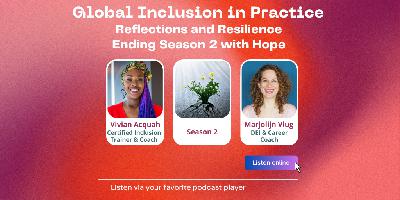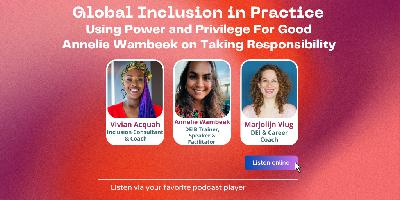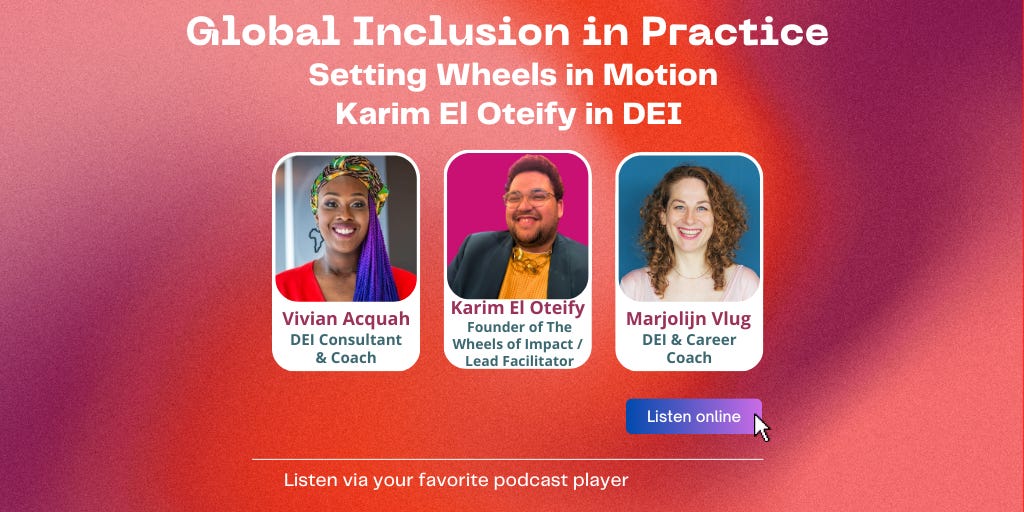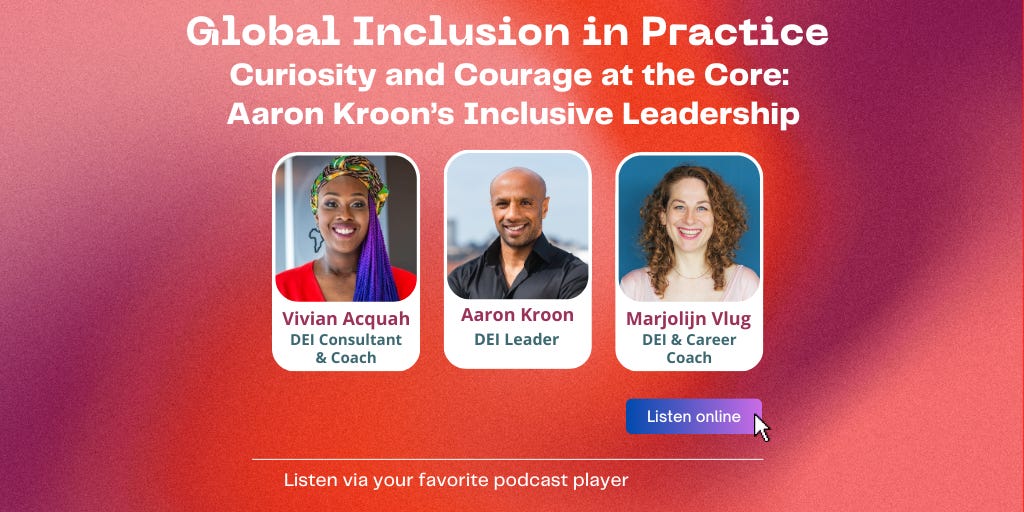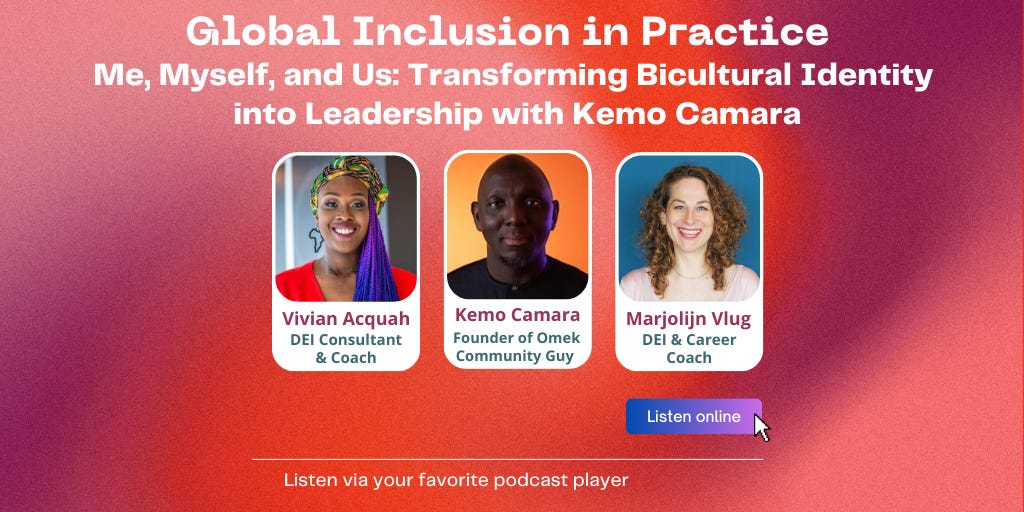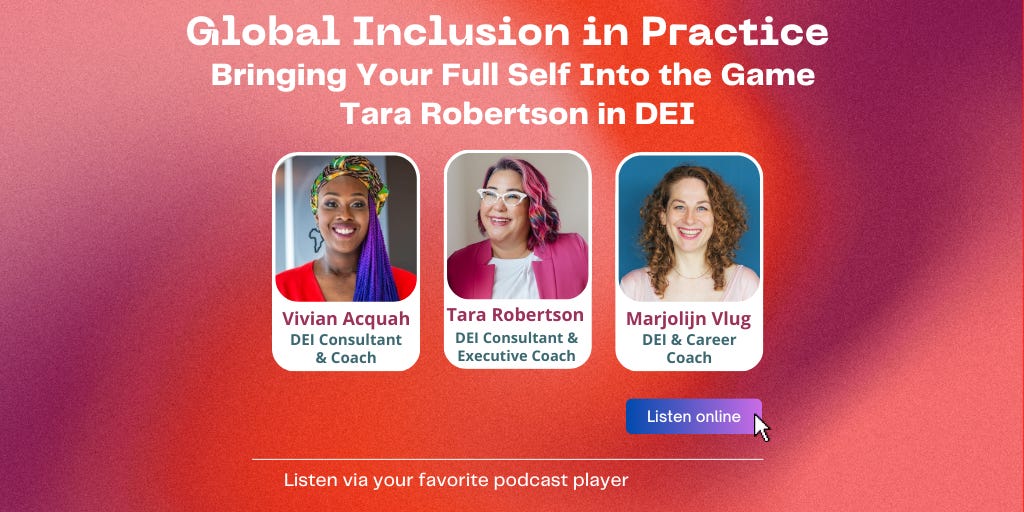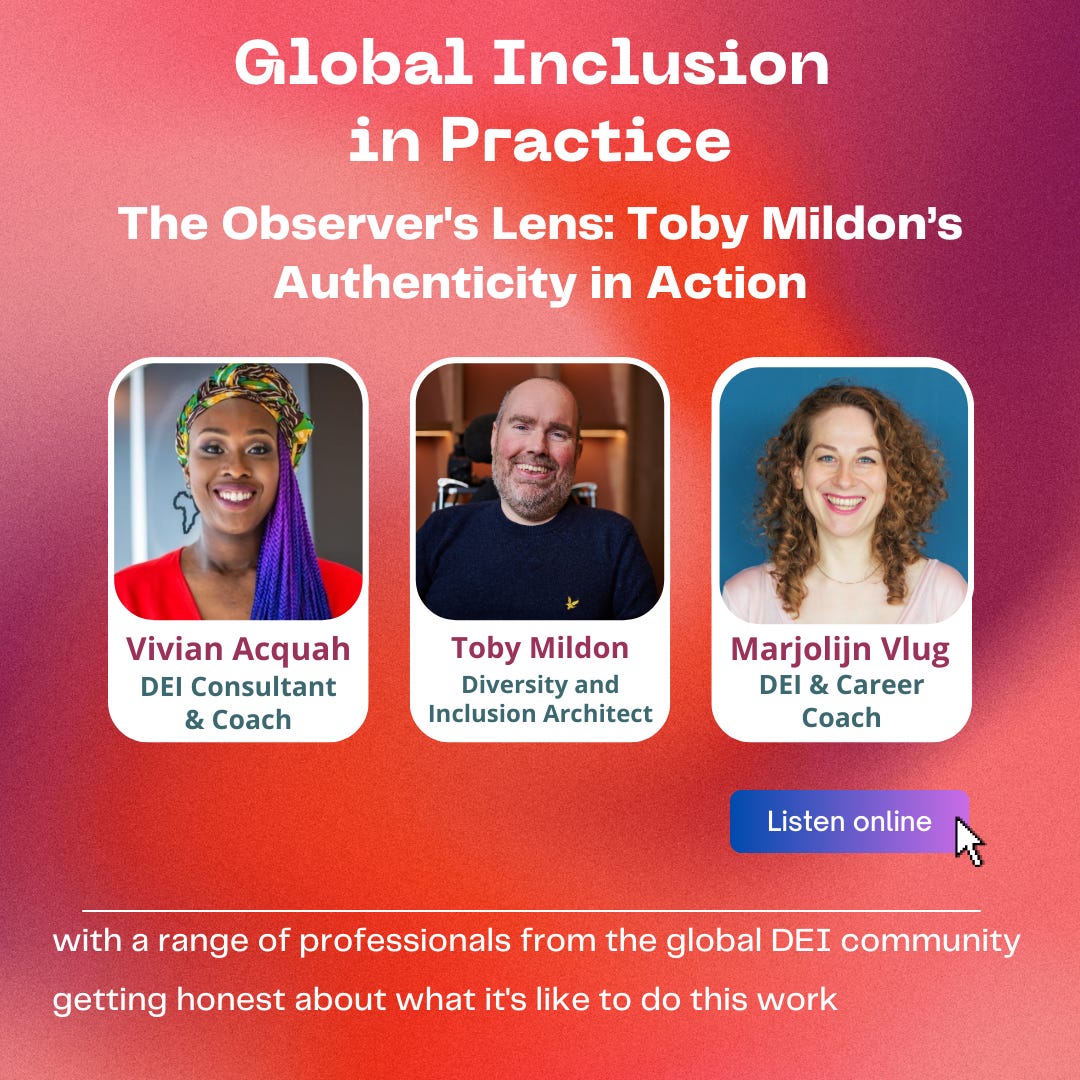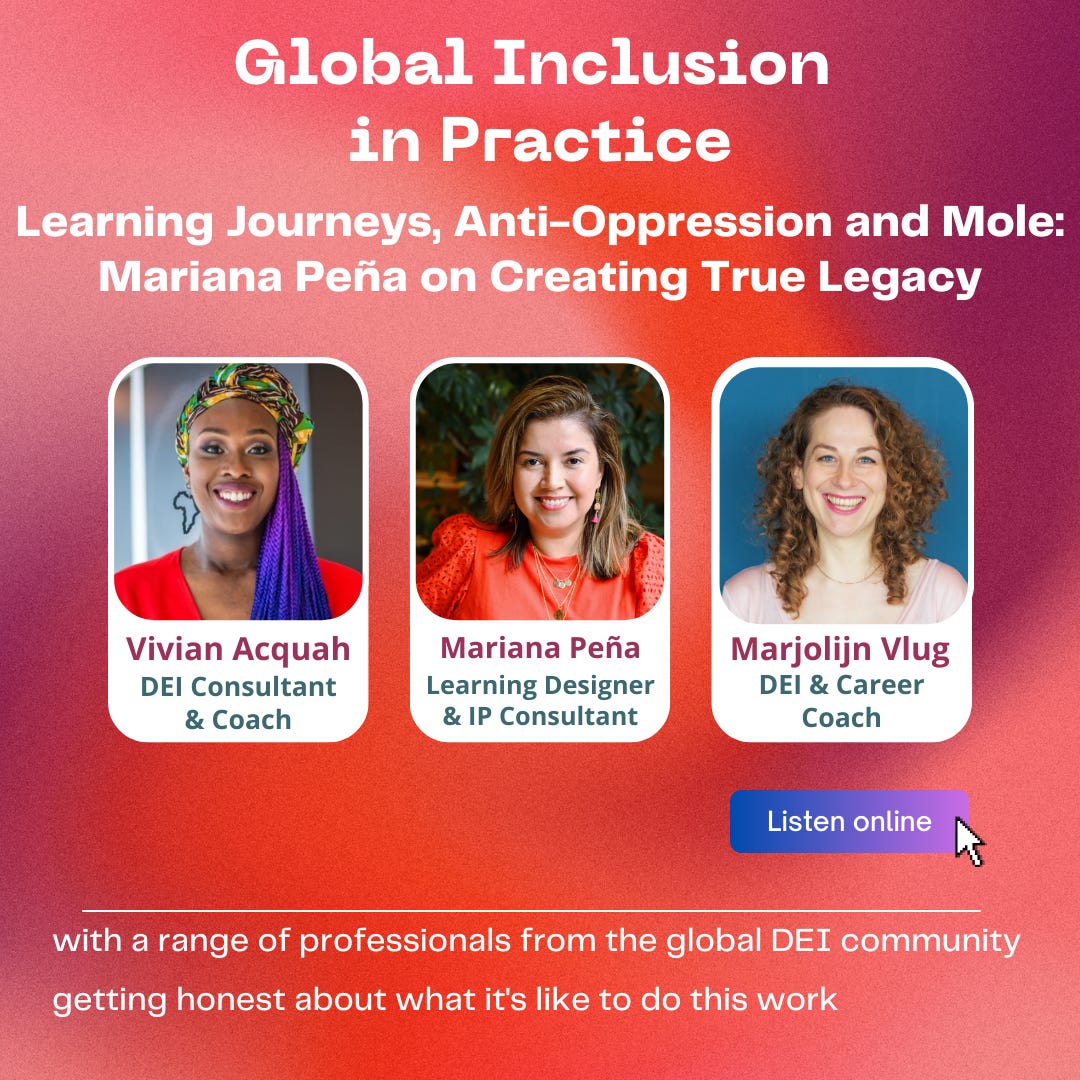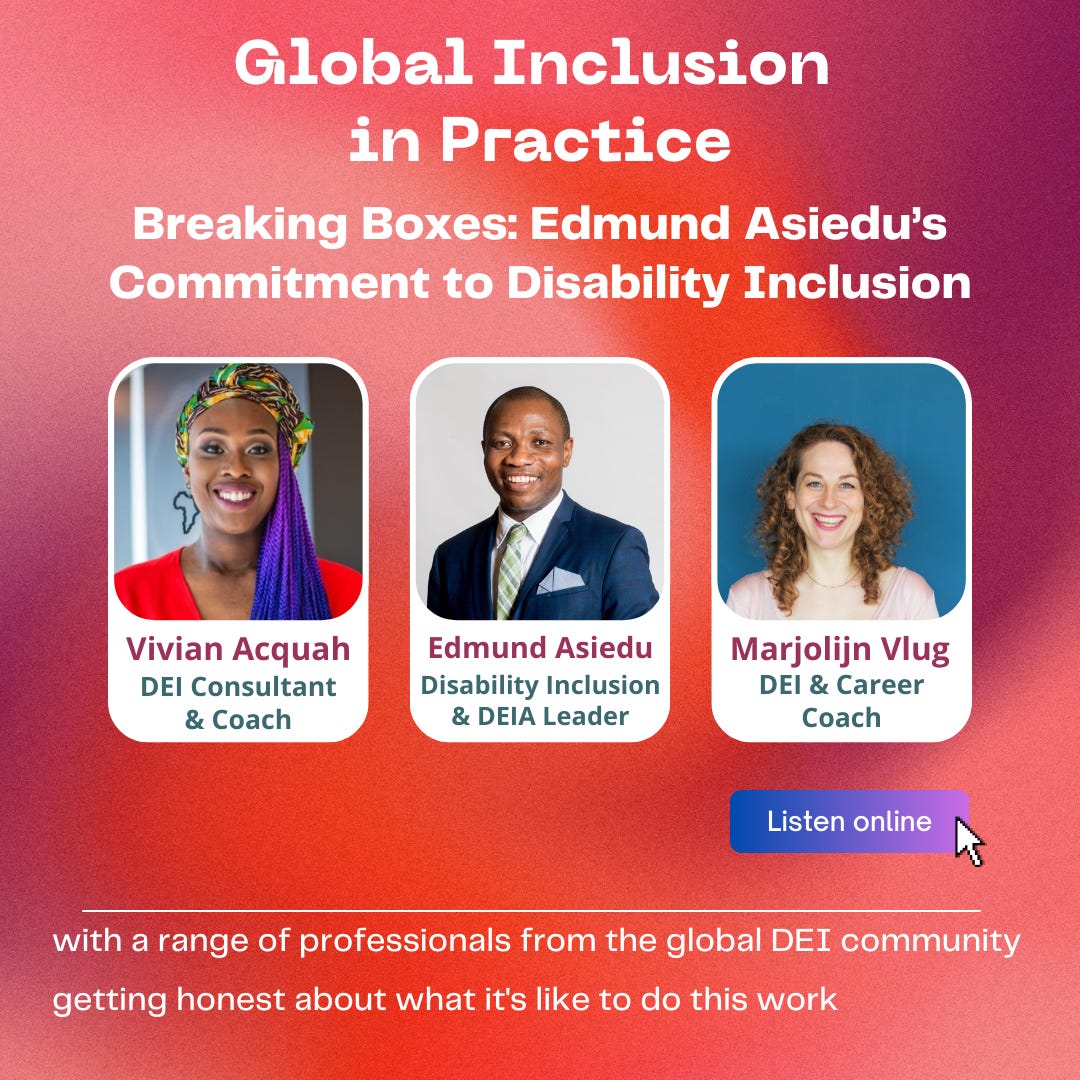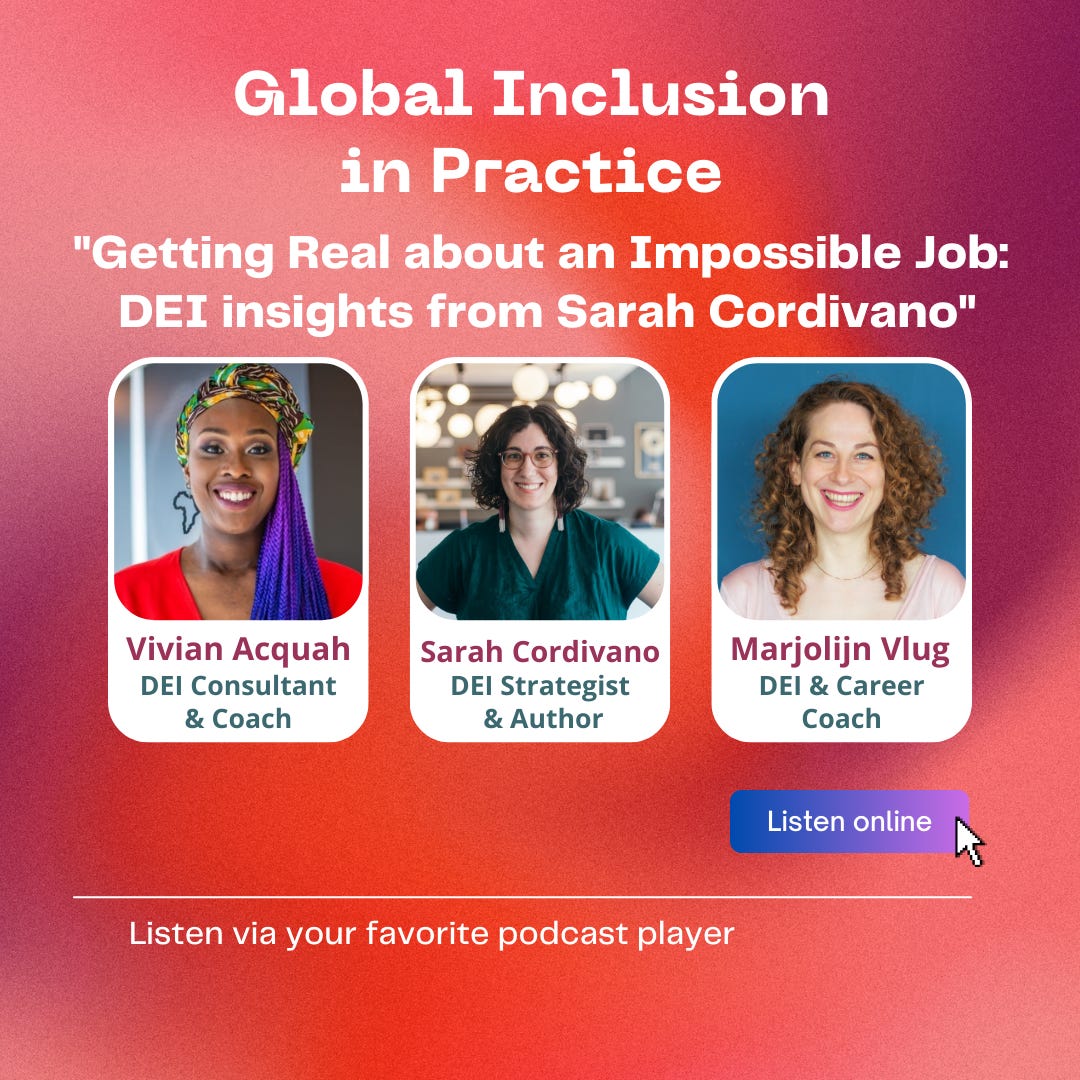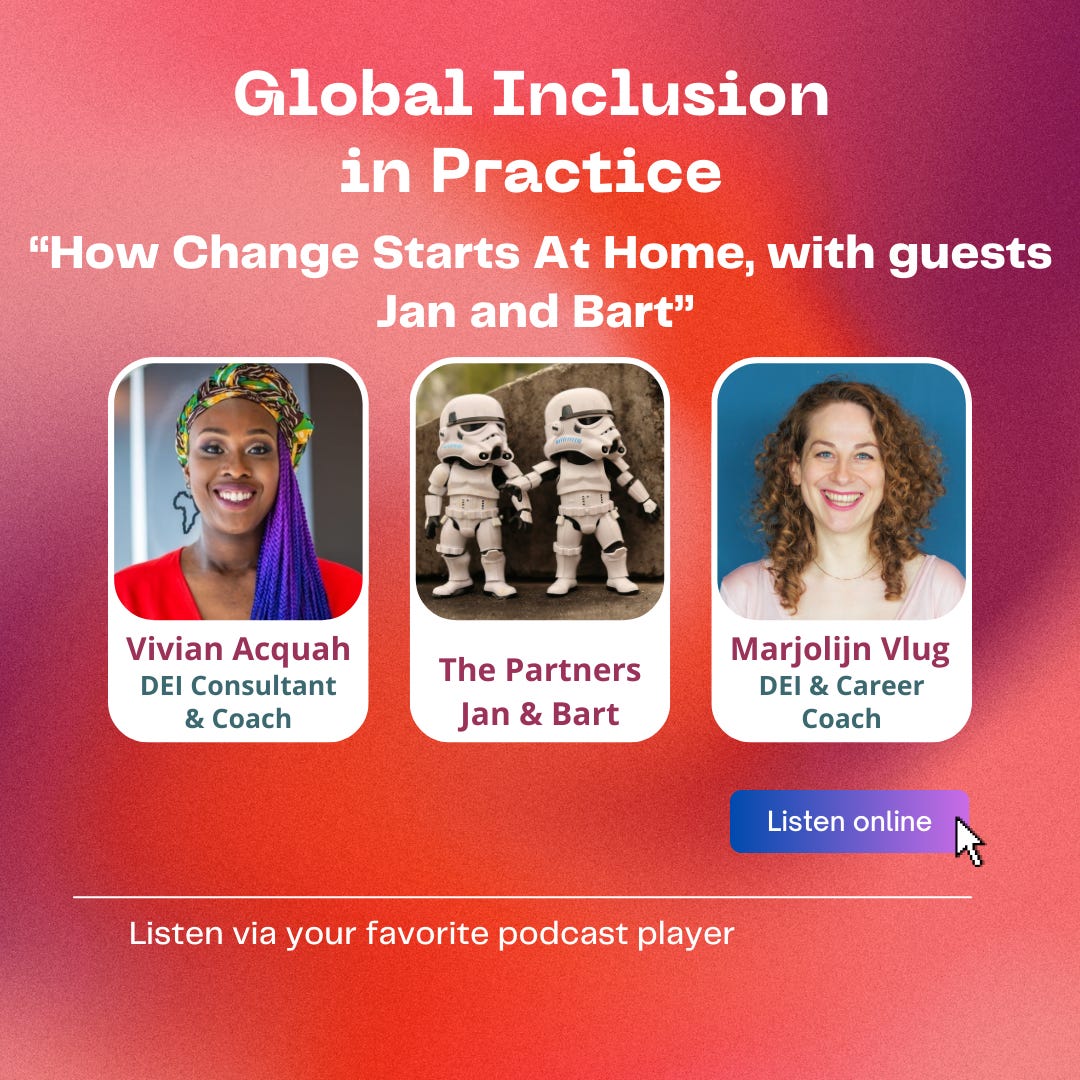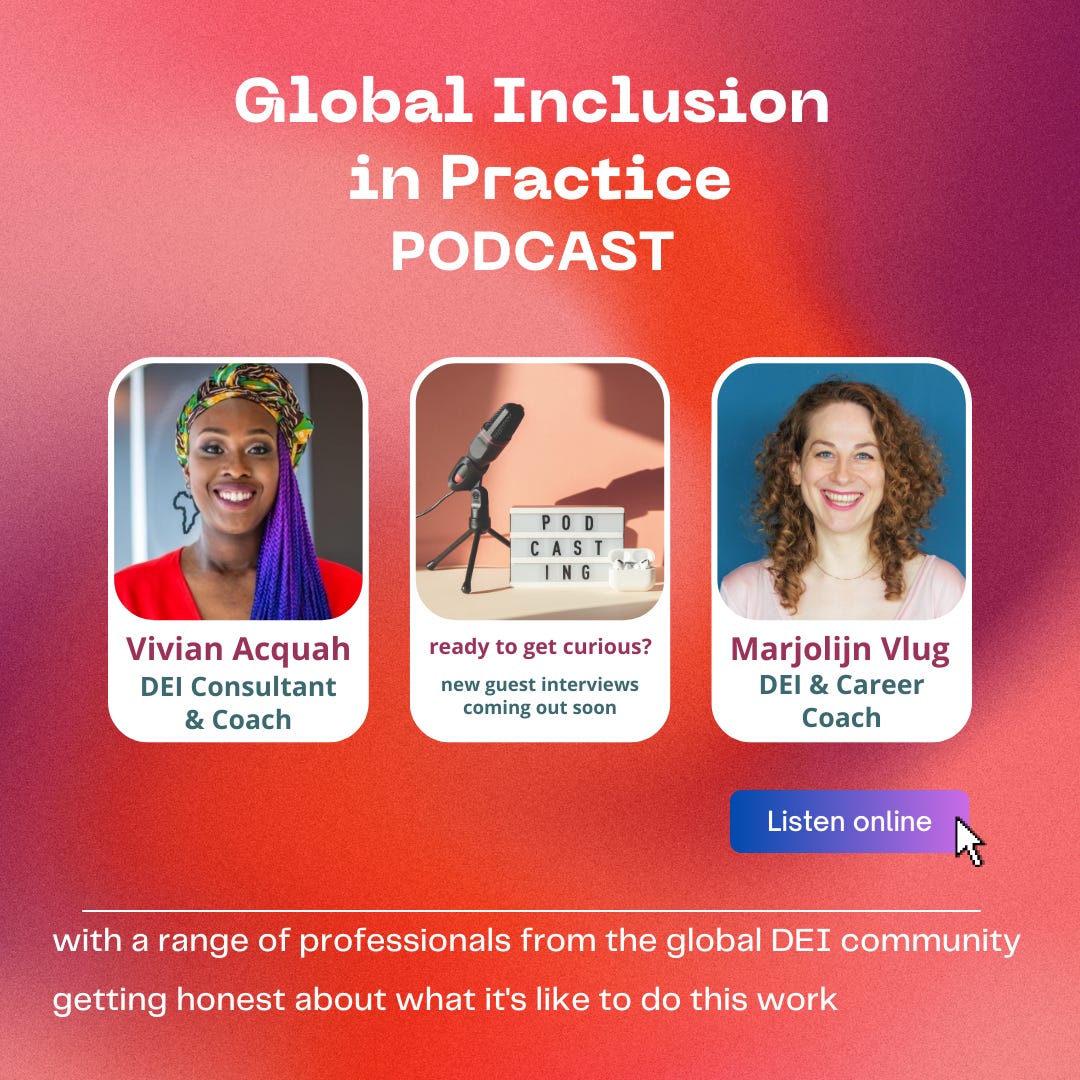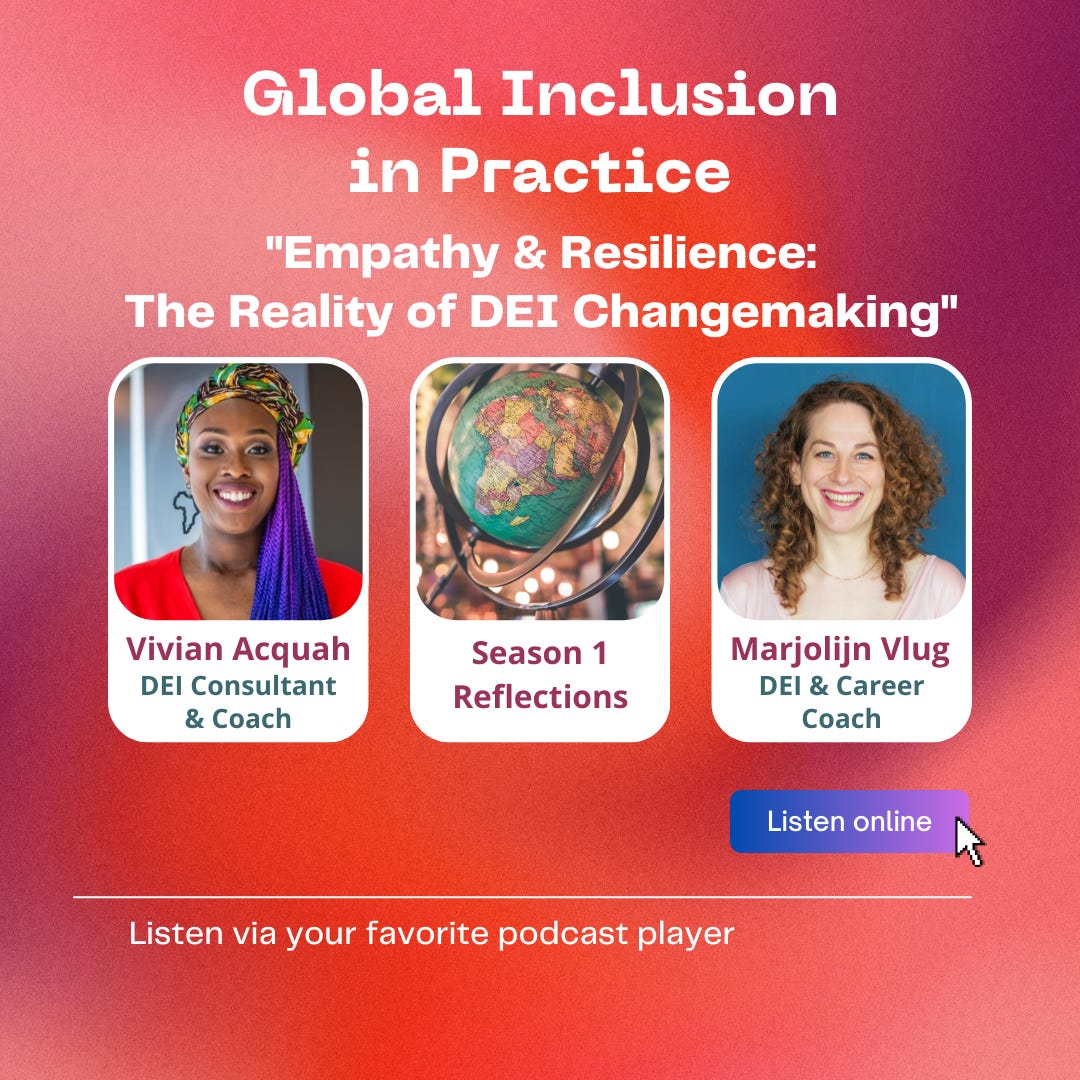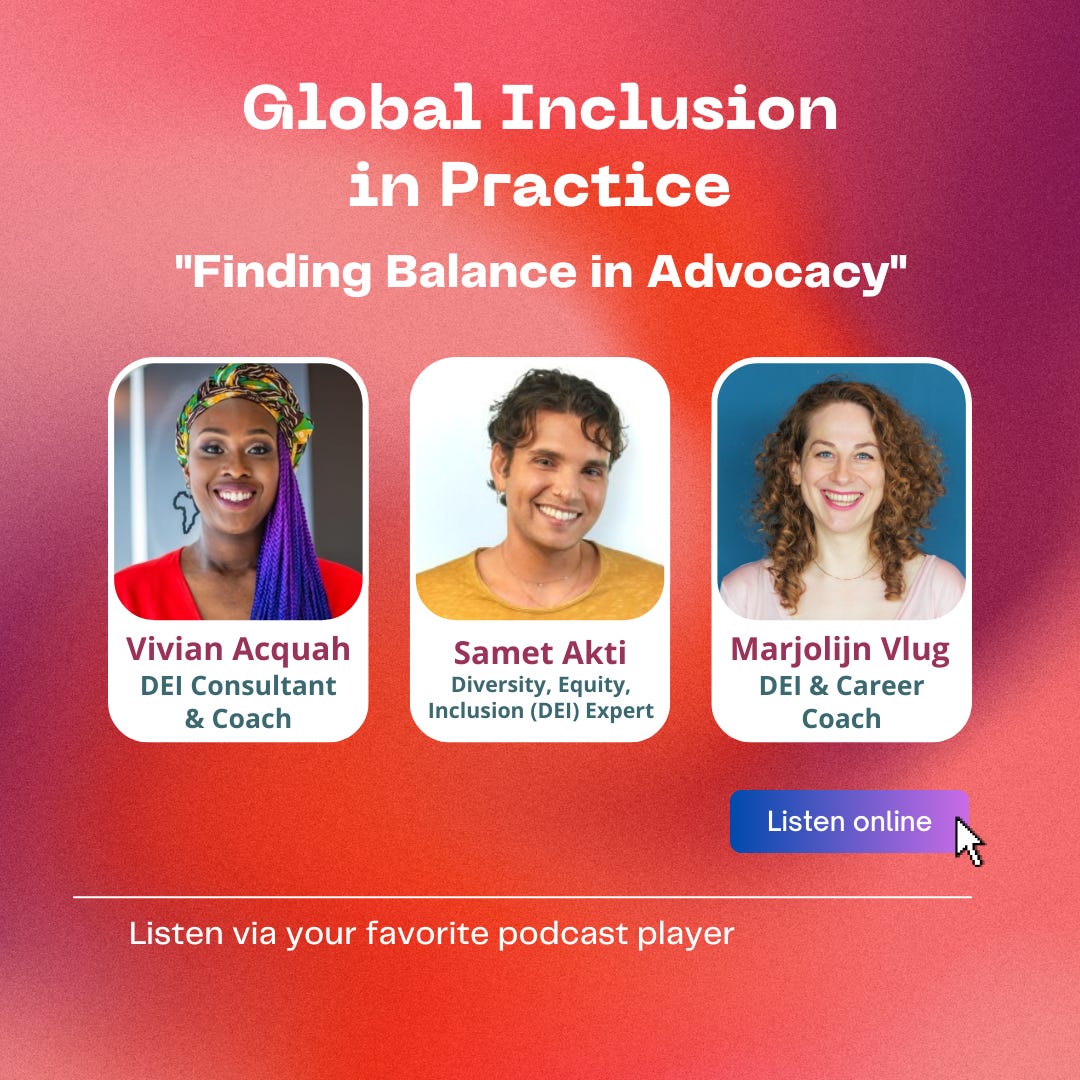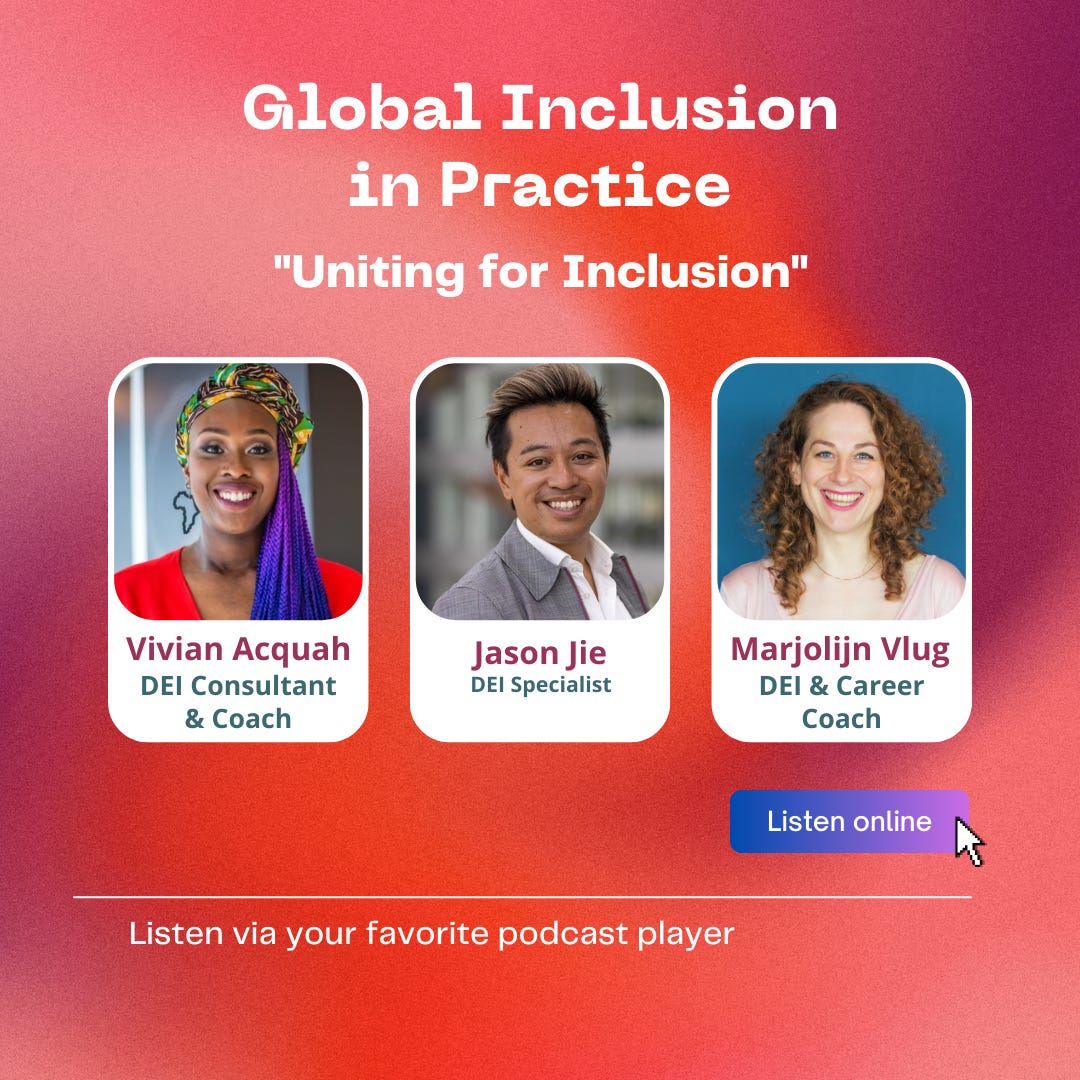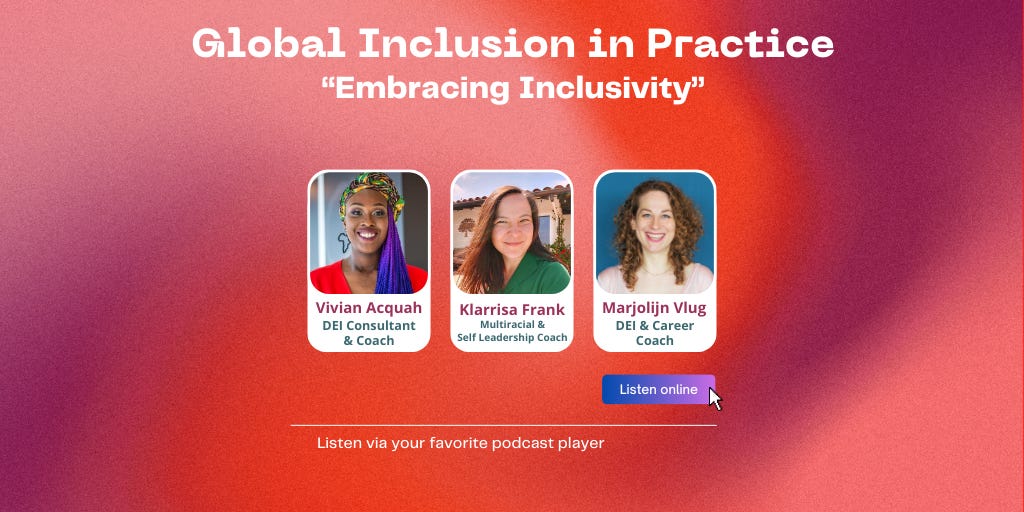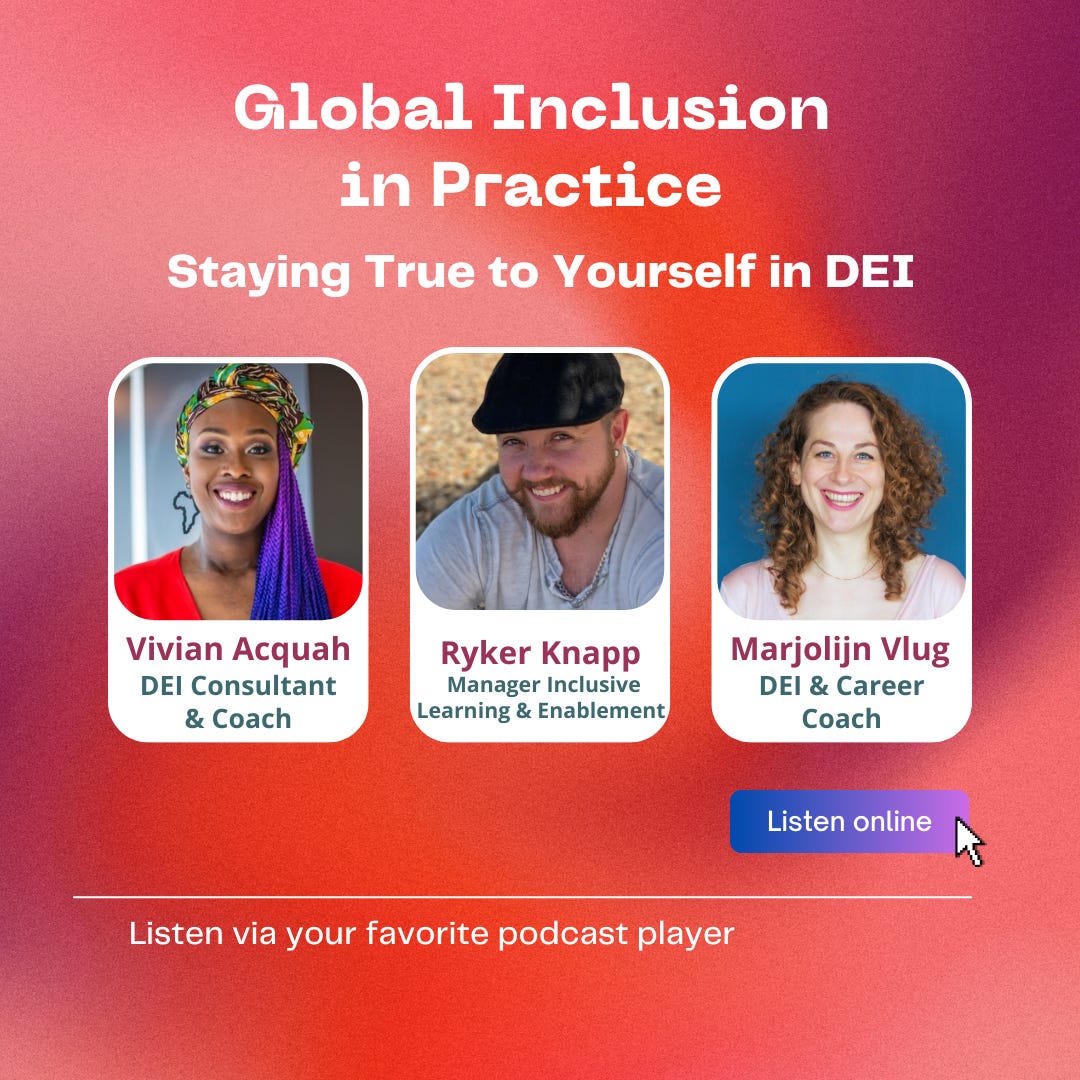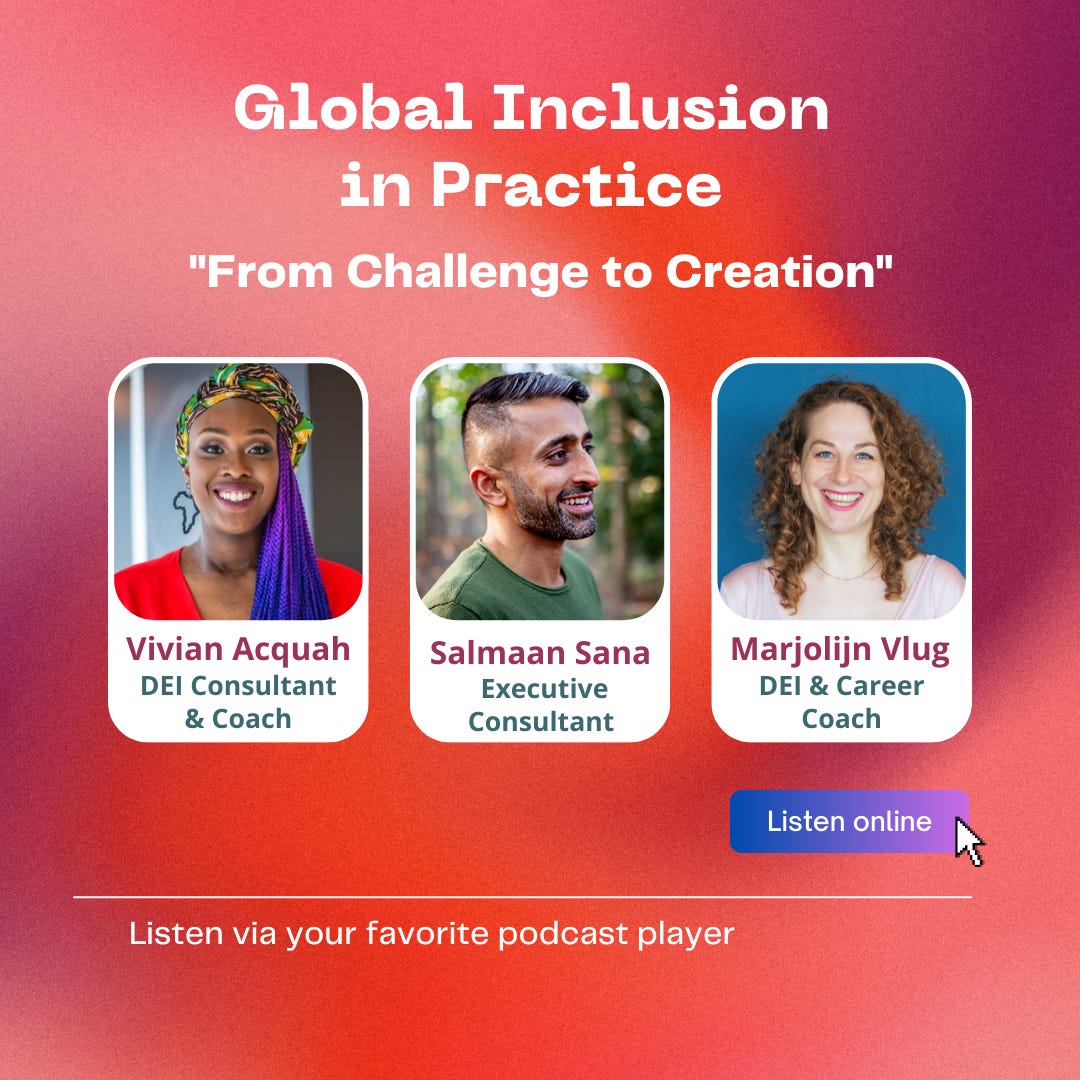Discover Global Inclusion in Practice Podcast
Global Inclusion in Practice Podcast

Global Inclusion in Practice Podcast
Author: Global Inclusion in Practice
Subscribed: 0Played: 1Subscribe
Share
© Global Inclusion in Practice Podcast
Description
Listen in on the behind-the-scenes stories of DEI change-makers from around the world and be inspired to make a difference in your own work.
In the Global Inclusion in Practice Podcast, Vivian Acquah and Marjolijn Vlug have kitchen table conversations with DEI professionals, representatives, advocates, and allies. Their personal stories tell you that you are not alone in your endeavors to create a more inclusive world. Let’s share perspectives on what sustains us in creating lasting change in different parts of the world.
globalinclusioninpractice.substack.com
In the Global Inclusion in Practice Podcast, Vivian Acquah and Marjolijn Vlug have kitchen table conversations with DEI professionals, representatives, advocates, and allies. Their personal stories tell you that you are not alone in your endeavors to create a more inclusive world. Let’s share perspectives on what sustains us in creating lasting change in different parts of the world.
globalinclusioninpractice.substack.com
25 Episodes
Reverse
“I see hope, and I also see an opportunity for us to be strategic, going stealth mode, and be resourceful in the way that we do our work.” - Vivian AcquahAs we conclude the second season of the Global Inclusion in Practice podcast, we’re grateful for the enriching episodes in this series and inspiring guests from various corners of the world, and across the spectrum of DEI, sharing their stories, their perspectives, and their context.What we appreciate about our conversations is that we talk about practical, pragmatic things and we also go deep. We are Vivian Acquah and Marjolijn Vlug, two women from different backgrounds coming with a supportive approach.Embracing joy and laughing together is part of how we maintain the energy and optimism we need. The vibe that we create together informs a safe space, positive approach and strong stance in our collective growth.The show notes for this episode are loaded, to provide you with inspiration!We do all this to let you know you are supported, so that you feel this podcast gives you some oxygen for the work that you're doing, that you feel the love and that you can learn from so many other change makers who are doing similar work. This is about connecting across distances, across areas and fields, across experiences. The connection is the thing. What is essential is that we are all human beings with a heart for inclusion and change-making. “Let your heart bring joy, let your heart bring curiosity, let your heart bring connection, and sometimes an “oh, no no no” with truth from the heart.” - Marjolijn VlugSee you next season!LISTEN TO THE FULL EPISODE WITH THE PLAYER AT TOP OF PAGE.Or in your favorite podcast app.About Vivian:Vivian Acquah, CDE®, is a Certified Inclusion Strategist dedicated to fostering high-performance environments where individuals feel valued, empowered, and equipped to thrive. With a strategic emphasis on breaking down systemic barriers to performance, she provides customised solutions to address the distinct challenges organisations encounter.With a name that literally translates to 'water,' Vivian has become an extinguisher of fires related to inclusion, providing clients such as Heineken, LinkedIn, Google, Indeed, Deloitte, TIBCO, Cargill, Swift, Acrolinx, KLM and Zalando with tangible strategies for embracing inclusive changes. * Website* Book a call* Linkedin* InstagramAbout Marjolijn:Marjolijn Vlug, a certified coach from Amsterdam, the Netherlands, specializes in partnering with DEI professionals, advocates and allies to create positive change and sustain their journey.With clarity, integrity and warmth, she helps navigate the challenges of Diversity, Equity & Inclusion work, fostering inner drive and leveraging strengths for lasting impact.* Website* Book a chat* LinkedIn * Instagram Empower Your Team with Actionable Inclusion Training by Vivian & MarjolijnWhen your organization wants to elevate its diversity, equity, and inclusion practices, consider hiring Vivian Acquah and Marjolijn Vlug, the dynamic hosts of the Global Inclusion in Practice Podcast.Renowned for their expertise in Diversity, Equity & Inclusion, Vivian and Marjolijn bring an engaging and practical approach that resonates with teams at all levels. Their training offers more than just theoretical knowledge—it’s full of actionable strategies that empower organizations to create inclusive environments where everyone can thrive.By tapping into their wealth of experience and fresh perspectives, your team will gain valuable insights and the tools to embed inclusion into the fabric of your workplace culture.With Vivian and Marjolijn, prepare for impactful sessions that inspire real change.Send a message via Substack via the button below or via LinkedIn. This is a public episode. If you would like to discuss this with other subscribers or get access to bonus episodes, visit globalinclusioninpractice.substack.com
“It's really important to remember global context. I'm sitting here in Northwest Europe, where a lot of companies are putting money and time and effort towards diversity, equity, inclusion, belonging, justice. But there are a lot of parts of the world where we are still fighting for, ‘the basics’, equality; we haven't reached the point of equity yet.” - Annelie WambeekAnnelie Wambeek is a freelance Diversity, Equity and Inclusion trainer who works at the intersection between DEI and intercultural competencies. After a corporate career in finance and foreign policy, she has gone freelance and in addition to training she does keynote speaking and facilitating.Culture is the spoke of the diversity umbrella that Annelie focuses on in particular, which is related to her personal background. She was born in Sweden, is half Sri Lankan and half English with Dutch ancestry, grew up in Spain, has lived in Kashmir and Wales and is now based in the Netherlands. LISTEN TO THE FULL EPISODE WITH THE PLAYER AT TOP OF PAGE or in your favorite podcast appAbout Annelie Wambeek Annelie has the privilege of working independently with global clients, at the intersection of the DEIB and intercultural fields, with a focus on belonging, decolonisation, power and enhancing inclusion. Interculturalism is both her work and life!Connect with Annelie via* Website * LinkedIn Empower Your Team with Actionable Inclusion Training by Vivian & MarjolijnWhen your organization wants to elevate its diversity, equity, and inclusion practices, consider hiring Vivian Acquah and Marjolijn Vlug, the dynamic hosts of the Global Inclusion in Practice Podcast.Renowned for their expertise in Diversity, Equity & Inclusion, Vivian and Marjolijn bring an engaging and practical approach that resonates with teams at all levels. Their training offers more than just theoretical knowledge—it’s full of actionable strategies that empower organizations to create inclusive environments where everyone can thrive.By tapping into their wealth of experience and fresh perspectives, your team will gain valuable insights and the tools to embed inclusion into the fabric of your workplace culture.With Vivian and Marjolijn, prepare for impactful sessions that inspire real change.Send a message via Substack via the button below or via LinkedIn. This is a public episode. If you would like to discuss this with other subscribers or get access to bonus episodes, visit globalinclusioninpractice.substack.com
“There are many gladiators in our corner, and we can truly change the world.” - Karim El OteifyKarim El Oteify is an intersectional spirit engaging in this concept that we call humanity, and in more earthly terms, a systemic change facilitator and diversity and inclusion consultant.As the Founder of The Wheels of Impact he focuses on DEI, communications, and change management, combining personal experiences with rich data. With storytelling, workshops, and consultancy, he drives impactful transformation to make people's workplaces the most inclusive they can be.Connect with Karim via WebsiteLinkedIn This is a public episode. If you would like to discuss this with other subscribers or get access to bonus episodes, visit globalinclusioninpractice.substack.com
“I take it really seriously that I'm a role model. Regardless of where we are in an organization, if we are leaders, we have a responsibility, and we are role models. That's the truth, and we can choose to do what we want with that. To me, that is leadership.” - Aaron KroonAaron Kroon has been passionate about inclusive leadership from the early days of his career. Leadership as a role in the organization, engaging with people, and inclusion as a non-negotiable element in that leadership.Aaron started out as a leader as an ambitious 21 year old. In the decades since, has had a lot of high leadership roles in Nordic companies, the latest decade mainly in People & Culture (HR). About a year ago, he decided that he wanted to try his own wings and started his own company called Black Batman, fully devoted to diversity and inclusion. He now traverses Europe to give keynotes about inclusive leadership and consults companies on building strategies around connecting diversity & inclusion to business success.Aaron recently got married to his husband, Lenny, and they live in Stockholm, Sweden, with their two dogs. About Aaron KroonAaron Kroon is a multi-awarded leader and public speaker. He has 25+ years of experience in leadership and has cemented his place as one of Sweden's most influential leaders. Aaron challenges the norm, inspires courage, and shows how empathy and inclusion aren't just right—they're the keys to real success. Through his company, Black Batman, Aaron helps leaders and companies across the Nordics to create successful organizations based on inclusive strategies. With lectures, insightful advice and groundbreaking workshops, he helps companies transform diversity into a powerful engine for innovation and profitability.Connect with Aaron via * Website* LinkedIn Amplify DEI New Year OfferEnd the year on a high note by advancing your DEI goals with Amplify DEI's interactive workshops, which are suitable for every level of your team.We're offering 20% off workshops when you book before February 28th, 2025.Click here to get in touch.Book a session/workshop before the 28th of February 2025, to receive the discount This is a public episode. If you would like to discuss this with other subscribers or get access to bonus episodes, visit globalinclusioninpractice.substack.com
“As human beings, we are created to be together. ‘Me myself and I’ does not work. It's ‘me, myself, and us’ that works. For me, community is the solution for everything. And that's on the personal level, on the collective level and the society level.” - Kemo CamaraKemo Camara was not sure why we decided that he would be a good guest on this podcast, but you’ll find out why soon enough… Kemo is a community guy, through and through. As the founder of Omek, a community platform for biculturals of African descent, his goal is to transform this generation of bicultural and even more importantly, the next generation of bicultural leaders into transformational leaders.Being bicultural can become a competitive advantage and, if leveraged properly, a superpower. Pairing that with growing leadership skills, society will become a better place, in Kemo’s powerful vision.You can read about this conversation below, but if you can, have a listen to the podcast audio (with the player above or in your podcast app) to hear the laughs, really get Kemo’s grounded passion, pick up his engaging vibe, and more. It’s hard to make that come across in the text.We write this article to make the podcast accessible for people who don’t process information through audio - as a way to be inclusive - but if you can, listening gives you the richest and most complete experience.Kemo feels that he is one of the most privileged human beings on earth. Born in Guinee in a large family with nine siblings, he grew up in a huge compound with 30 up to 50 people at any moment. He recognizes this as the natural ‘human technology’ that he lived in, where he had his mom and dad, aunties and uncles, big brothers and sisters, cousins, and everybody knew their place in a system based on respect. Growing up in that space, he was immersed in the idea of community: one for all, all for one. The whole family was there to support each other and contribute to the system. LISTEN TO THE FULL EPISODE WITH THE PLAYER AT TOP OF PAGE Or in your favorite podcast appAbout Kemo CamaraKemo Camara is the visionary behind Omek, a community-centric platform whose mission is to amplify the talent, voices, and energy of biculturals of African descent. A social entrepreneur, community influencer, economist, and captivating speaker, Kemo’s journey has spanned continents, with impactful engagements across Africa, the United States, and Europe. He is a firm believer in representation and equal access to opportunities. His passion lies in activating our collective human potential. That’s why he enjoys bringing people from diverse backgrounds to work together toward a common goal. Kemo believes that the potential of the bicultural talent, especially those of African descent, is massively untapped and, when unlocked, will create empowered professionals who are meaningful contributors to the economy and culture. Connect with Kemo via * LinkedIn* Omek website* InstagramResources & references from this episode* Podcast: What Now? With Trevor Noah Amplify DEI End of Year OfferEnd the year on a high note by advancing your DEI goals with Amplify DEI's interactive workshops, which are suitable for every level of your team.We're offering 20% off workshops when you book before December 20th, 2024.We offer workshops on 10+ topics, including:* Deactivate Microaggressions @ Work* Amplifying Inclusive Self-Leadership** Amplifying Inclusive Leaders (for leaders and managers)** Boost Authentic Allyship** Intersectionality @ Work** Empowering Neuroinclusive Leadership** Embrace Neuroinclusion @ Work** Boosting Psychological Safety @ Work* Check Your Unconscious Bias** Navigating Courageous Conversations with Productive Outcomes**The topics mentioned above can be combined with the impactful VR experience, allowing participants to experience walking in the other person's shoes. The VR experience can only be held offline.Workshops can be held in person or virtually*. Ready to learn more?Click here to get in touch.Book a session/workshop before December 20th, 2024, to receive the discount. This is a public episode. If you would like to discuss this with other subscribers or get access to bonus episodes, visit globalinclusioninpractice.substack.com
“I want to make equitable futures irresistible, I want it to be so juicy and delicious, like: how could you want anything else?” - Tara RobertsonTara Robertson is a diversity, equity and inclusion strategist. She works with companies to use data to diagnose what's going on and to help make things better in a lasting, sustainable way. She is also a leadership coach, primarily serving women of color to be more unapologetic and wildly successful in their careers. Women of color are the center of her universe, but in her coaching as well as her strategy work she serves lots of people that are drawn to her style.Tara surprises herself in how personal she gets with her answers in this conversation - and surprises us as well in asking questions right back at us. Coaches gonna coach. You can read about this conversation below, but if you can, have a listen to the podcast audio (with the player above or in your podcast app) to hear the laughs, really get Tara’s vibe, hear her flip questions back on us, and more. It’s hard to make that come across in the text.We write this article to make the podcast accessible for people who don’t process information through audio - as a way to be inclusive - but if you can, listening gives you the richest and most complete experience.Connect with Tara via * LinkedIn* Website* Sign up for Tara's monthly newsletter (warmly recommended by Marjolijn)Amplify DEI End of Year OfferEnd the year on a high note by advancing your DEI goals with Amplify DEI's interactive workshops, which are suitable for every level of your team.We're offering 20% off workshops when you book before December 20th, 2024. This is a public episode. If you would like to discuss this with other subscribers or get access to bonus episodes, visit globalinclusioninpractice.substack.com
“You can't go any deeper with your clients than you can go within yourself. And if you can't go that deep, you're going to stay in one space.” - Amri B. JohnsonAmri B. Johnson is a seasoned DEI practitioner and organizational culture advocate, CEO & Founder of Inclusion Wins. He is a husband, a father, a stepfather, a son, an uncle. He is immensely well-read and connected with the historical and conceptual roots of DEI work. He’s an American living in Basel, Switzerland, still trying to figure out if he’s an expat or an immigrant.You can read about this conversation below, but if you can, have a listen to the podcast audio (with the player above or in your podcast app) to hear the laughs, really get Amri’s vibe, and more. It’s hard to make that come across in the text.We write this article to make the podcast accessible for people who don’t process information through audio - as a way to be inclusive - but if you can, listening gives you the richest and most complete experience.In a career spanning from working as a manager in the health sector to becoming an entrepreneur, Amri is exceptionally great at working with organizations to engage with tension and complexity in their everyday work, growing people’s capacity to work with complexity, making diversity normative, and creating the conditions for everybody in the organization to thrive.Connect with Amri via WebsiteLinkedIn Amplify DEI End of Year OfferReach out for the Amplify DEI End of Year Offer, which is valid when you book before December 15th, 2024. Click here to get in touch. This is a public episode. If you would like to discuss this with other subscribers or get access to bonus episodes, visit globalinclusioninpractice.substack.com
“From a very young age, I learned to be an observationist. I didn't have the opportunity to go and play football with friends at school. I was an observer of the sport. So naturally, I've developed the aptitude, skills and abilities to be an observer.”” - Toby MildonToby Mildon is an ambitious consulting business owner, a thoughtful team leader, with a deep commitment to his work as a Diversity & Inclusion architect. As a disabled gay man, he has developed great observation skills on human behavior. He also brings honesty and personal perspectives to this episode..Thank you for listening and being a part of this ever-expanding connection and growth. Together we pack a punch, share our fascinations (and frustrations), create impact, and hold spaces for a wide range of perspectives to be valued and included.LISTEN TO THE FULL EPISODE WITH THE PLAYER AT TOP OF PAGE Or in your favorite podcast appAbout Toby MildonToby, an Equity, Diversity & Inclusion Architect and Mildon founder, has worked with BBC, Deloitte, Accenture, and more. Author of 'Inclusive Growth', he crafts bespoke strategies for inclusive workplaces, driving innovation and business performance.Connect with Toby via * LinkedIn: https://www.linkedin.com/in/tobymildon/ * Website: https://www.mildon.co.uk/ * ‘Inclusive Growth Show’ Podcast: https://inclusivegrowthshow.buzzsprout.com/ Resources & references from this episode:The Game Changer Index Book: Verña Myers - “Moving Diversity Forward”* Book: Scott E Page - The DifferenceCrip Camp - Netflix Documentary* Toby’s books ‘Inclusive Growth’ and ‘Building Inclusivity’ https://www.mildon.co.uk/resources/ This is a public episode. If you would like to discuss this with other subscribers or get access to bonus episodes, visit globalinclusioninpractice.substack.com
“It is hard to try to fit in, and those molds can break you sometimes. So instead of allowing a mold to break you, why don't we break them ourselves?” - Mariana PeñaMariana Peña is a learning designer for, as she likes to call them, revolutionary experts who want to change their industries and the world at large, one online program at a time. Every time Mariana works with a client, she infuses some anti-oppressive learning into the programs she helps create.Personally, she is a Mexican mama of two bicultural kids living in the Netherlands. And she is an enormously kind, poetic, intelligent, and funny person who opens up about her experiences of life. You can read about this conversation below, but if you can, have a listen to the podcast audio (with the player above or in your podcast app) to hear the laughs and tears, get hungry with us from the food references, and more. It’s hard to make that come across in the text.We write this article to make the podcast accessible for people who don’t process information through audio - as a way to be inclusive - but if you can, listening gives you the richest and most complete experience.The first thing Mariana wants you to know is that if you ever felt that you don't fit into any type of mold, you don't have to fit in. “If you think that you're a mold-breaker, you are. You can. And this is your permission slip to do so.” - Mariana PeñaWe're not going to get rid of molds, she believes. But we can bend them. We can break them. We can create our own. And in the quietness of not fitting in, we can find where we belong. Even though we try our best to turn it into a positive thing, like: I'm resilient, I'm a fighter, I'm a survivor… Yes we can do that, we can shift the narrative, for sure. But we should also take a pause and acknowledge that we're not making things up.Mariana is open about having battled depression all of her life. She is aware of what, for her, has been the most helpful support she’s ever received, which is holding space and just being with someone. “If anyone is listening and they have been through something like this and they feel, ‘I'm never gonna fit in, they're never gonna get me,’ I can sit there with you. I don't know how to fix that, but I can sit there with you. And know that you're not the only one.” - Mariana PeñaWhat Mariana says reminds Vivian of Ava DuVernay’s words: “I’m not going to continue knocking on that old door that doesn’t open for me. I’m going to create my own door and walk through that.”Mariana’s never been part of corporate, DEI, or otherwise. She’s been in academia and is now running her own business. However, throughout her professional journey in developing learning programs, she has been very aware of diversity, equity, and inclusion (and the lack thereof). Data based on studies performed on white people, for example, run by white people and analyzed with a white lens. It didn’t sit well with her at all, and when she brought it up, she was accused of making things up. So, she incorporates this from her own learning about anti-racism and decoloniality.“Diversity, equity, and inclusion for me is directly connected to unpacking my own personal journey of discovering what has been the impact of colonialism in my life.” - Mariana PeñaShe educated herself on the way colonialism, racism, and colorism are entangled in the history, culture, and society of her native Mexico. When she moved to the Netherlands, she continued learning more about this from a more global perspective.“When I moved to the Netherlands and I started learning about Dutch history, which is a wild ride, I felt the need to really unpack: what is the impact of colonialism in the world at large? What have we done to populations? How is it that we have erased cultures in the name of what? Trade? Commerce? What? Why? So DEI for me goes directly to that place.” - Mariana Peña Her growing awareness led her to adopt an anti-oppressive lens in designing curriculum. She firmly believes that education can change the world, but it has to have an anti-oppressive lens because otherwise, we’re just replicating systems of oppression, and she does not want to participate in that. Marjolijn appreciates how much Mariana sees about this. “We've started to develop and learn about racism, gender inequality and equity. And this decolonizing journey, I feel like we're just at the start of it. Mariana, you're seeing so much of what is actually here, what's actually happened, rather than all the shiny pink facade that is not the truth. Real history and the impact of it on today hasn't been explored and shared much yet.” - Marjolijn VlugThis brings Mariana to tell us about mole (pronounced as MO-lé (see recipe below)), a Mexican type of sauce, rich and thick, made with various chilies and with chocolate. It’s a polarizing dish that people either love or cannot stand. Kids usually don’t like it, but as you grow older and understand the love and care that goes into making it, That’s also the kind of person Mariana is. For some people, she’s a lot. ‘But on the flip side, if you're in for the ride, then we can do wonders together. We can explore. We can question. We can, you know, get creative. We can dare to say and think.’An important moment in Mariana’s life was when she applied for a position that she knew was just right for her; she had all the academic and professional merits. She was rejected for the job because she was ‘a little bit too brown for it’, as it was a position that connected with external stakeholders. It was a humbling, crushing experience because it was the first time she was brought to question the meritocracy she was brought up to believe in. Her parents motto to ‘work hard and then you’ll reap the rewards’ turned out not to be true.The second impactful time was a conversation with her kid during the Black Lives Matter surge of 2020. It was the moment he asked her, ‘Why are your knuckles so dark?’ and said, ‘You have to wash your hands better,’ that led to their first conversation about race. She realized that this racialized world was not only impacting her; it was also going to impact her son. It led to a deep dive into raising multicultural families, racism, and an even bigger picture, which became a tipping point for her. “What is happening right now, what we're seeing in life is wrong. And I get to learn, I get to do something, I get to take action.” - Mariana PeñaIt led Mariana to decide that her work needed to be aligned with this, her clients needed to be aligned with this as well. And she’s still unpacking, deconstructing, and finding who she is. ‘Do I really like this or have I been taught to like this? Do I think this is right because I think this is right? Is this my own moral compass?’ She feels she is still on this journey.Meanwhile, her son reminds her that she’s also an easygoing person with a great sense of humor. “I also deserve to be fun and to create these moments of joy for the pure joy of it. That's something that I also remind myself when I am learning from others because these are such dense topics. We are humans, and we need joy. We deserve it.” - Mariana PeñaVivian wholeheartedly agrees: with the hardships and difficulties in the world and in the DEI space, we still deserve to choose joy and keep bringing in our sense of humor.“The topic of DEI can be very serious, very sensitive, very, very realistic, but that doesn't mean that we cannot have fun.” - Vivian AcquahMariana feels alive and recharges when she cooks. When she’s in the kitchen, she lets go of rules, measurements, and restrictions. She experiments and plays around in the kitchen while listening to music. She loves it when her son comes in and is interested in helping out. It’s a cycle breaker for her because boys aren’t allowed in the kitchen in Mexico. Cooking with her kid is also a way to share her Mexican culture with him. All of this is part of her legacy, she deeply feels. Right now she’s working on being a safe space for her kids. On being a little less afraid and more happy each day, letting go of the Catholic concepts of sin and guilt. On appreciating the choices she gets to make and the privilege of living in a country with relatively safe streets. “Every day matters, in every sense of the word. Professionally, every single effort that we do compounds because I know that myself alone, I cannot change the world. But every single thing that I do is tied up to all of the other little efforts that everybody else is doing. And that's how we move mountains. That's how it happens. And on a personal note, I remind myself that everyday matters. Sometimes, depression is very difficult to live with, and that's okay. I have to focus on today, and that has to be enough. And when I manage to do that, it turns out great.” - Mariana PeñaMariana has huge hope for the Alpha generation being the cycle breakers. All we need to do is make sure we don’t do anything to stand in their way as they move around the world shifting narratives, shaking things up. We are committed, trying to change things and realizing our limitations. We want the generation of kids we are raising to be able to have joy, to experience life, to feel free and safe, but also to inquire after things and have the humility to rectify when they are wrong. As parents, we are cycle breakers, and unpacking colonialism is a part of that.“As parents, we understand the damage that we went through. We're trying to understand ourselves first and then we are trying to liberate those generations that are coming after us to be able to function.” - Mariana PeñaAs Mariana moves through her decolonial journey, the next milestone ahead of her is to appreciate the positive aspects of the culture of the Netherlands and other countries that were colonizers. She is making her home in this country and recognizes the complexity of human beings. We’re not entirely evil, and we're not entirely benign. Rather than giving us her recommended books, podc
“I want to grow up to be someone who makes sure that we are always creating that level playing field for everyone to thrive.” - Edmund AsieduEdmund Asiedu (he/him/his) is a black man originally from Ghana, West Africa, now living in the United States. Edmund's primary focus is on promoting independent living for individuals with disabilities. His career has spanned various fields, including career development and education. Throughout his career, Edmund has accumulated knowledge about resources and tools available for individuals with disabilities. Currently working as an accessible transportation professional, he has strategically worked in different sectors to gain a comprehensive understanding of the factors contributing to this goal: Education: as a crucial tool for individuals with disabilities. Employment: in career development, helping people with disabilities secure jobs. Transportation: making transportation more accessible for individuals with disabilities. And Housing: Edmund aims to work in public housing in the future, addressing the lack of accessibility in many buildings globally.About Edmund AsieduEdmund Asiedu is a proud person with disability, a passionate accessibility, disability inclusion, and inclusive mentoring advocate who raises awareness on the needs of persons with disabilities in educational institutions and workplaces. He uses he/him/his pronouns. Born and raised in Ghana, Edmund studied at St. Mary’s Boys High School and the Ghana Institute of Journalism. He relocated to the United States in 2010. Before joining New York City Department of Transportation as a Policy Analyst for Accessibility, he held positions at Columbia University School of Public Health, Berkeley College, Cypress Hills Local Development Corporation, Lehman College, National Disability Rights Network, and Ghana Society of the Physically Disabled.Edmund holds a Bachelor of Social Work from the Lehman College and a Master of Public Administration from Baruch College School of Public and International Affairs. He served on the Disability Access and Accommodations Committee at the Columbia University Medical Center. Edmund currently serves as the Co-chair of the Advisory Council of the National Disability Mentoring Coalition (NDMC) in the U.S. This is a public episode. If you would like to discuss this with other subscribers or get access to bonus episodes, visit globalinclusioninpractice.substack.com
“I'm doing something for the community, giving back in a way. Having a place where people could feel heard and connect, because there's so much isolation in this work that it's hard to actually make those connections.” - Sarah CordivanoIn this episode, we sit down with Sarah Cordivano, DEI author, strategist and change maker originally from Philadelphia, who now splits her time between Berlin and Zagreb.Sarah is a dedicated advocate in the field of diversity, equity, and inclusion (DEI) with plenty of strategic experience in tech, from big corporate to non-profit and social enterprise. She is also the author of the mic drop-titled book “Diversity, Equity, and Inclusion: How to Succeed at an Impossible Job”. Sarah’s international perspective, spanning work experiences in both Berlin and Zagreb, allows her to experience different cultural contexts and approaches to DEI, enriching her understanding and strategies, and addressing DEI from a broader, more interconnected lens.As an American in Europe, Sarah acknowledges the privileges and advantages she holds, and the importance of leveraging these privileges to advocate for inclusive practices. She notices the benefit of having learned strong communication skills in the US education system. “The US education system [has] given me a chance to really practice how to communicate, how to convince people of things, how to get them on board or argue topics in different ways, which I think can be really helpful in DEI work.” - Sarah CordivanoSarah’s public speaking tip: practice. Just take any chance you can to speak in a group, even if it's small. Raise your hand for podcast interviews, practice giving talks with your friends about topics you're passionate about. This is how it comes, doing it over and over again and then asking for feedback and learning from that feedback.When Sarah was younger, she never really thought about DEI as a career path, but looking back at the different steps she took in different directions, she feels like she’s been unconsciously steering towards this path: her professional background is a Venn diagram of three skills that make her a perfect fit for DEI. The first is project management, being able to bring order to chaos and deliver projects. Then there is community work, being able to build community and understanding how to motivate communities to come together to do great things. And lastly, data analytics, working with complex datasets to understand patterns of information. “Being able to ask questions of data and move beyond anecdotes, really backing up the work that we're doing with actual numbers, I think that's a superpower.” - Sarah CordivanoUsing data to support DEI initiatives is something that has significantly shaped Sarah's approach to DEI. She sees opportunities to collect meaningful data even within strict regulatory frameworks like European GDPR rules. The ability to back up DEI efforts with concrete data is crucial, offering a way to quantify progress and highlight areas needing improvement. It's also a powerful tool to persuade stakeholders, especially leaders who are numbers-driven in their decision-making.On the other side of the coin is something that relates back to the last-but-not-least chapter of Sarah’s book: the how to’s of self care and managing our personal relationship with the DEI work we do. Because yes, it can feel very lonely and isolating. For Sarah, writing her book became a therapeutic outlet, providing the distance and perspective she needed to process her experiences and frustrations, as well as give back to the community.“You have certain expectations of what you want the job to be or what kind of impact you want to have, and it's really hard to actually keep going, to bring those expectations to life. And you end up constantly reframing what your goals are and what you want to do.” - Sarah CordivanoSarah shares common misconceptions about the DEI role, such as being viewed as a fix-it-all entity or an emblem of approval. Vivian agrees and acknowledges the importance of clarifying the role to prevent unrealistic expectations and burnout. Having these conversations is insightful, as it highlights the practical aspects of DEI work and the need for a clear understanding of what DEI professionals can and cannot do.“[It’s] a gift to the community to hear people talk about this work honestly.” - Sarah CordivanoAs DEI professionals, we're often in the middle between strong decision makers or stakeholder groups with, for example, employees or ERGs on one side, and HR or leaders on the other. We're trying to get everyone to compromise, and we may eventually get there, but by that point it's been an exhausting journey. We put so much time and energy into it, but in the end, through all of the compromise it may not even feel like success. Whether it's communicating with colleagues, leadership, or the broader community, effective communication helps ensure that initiatives are understood, welcomed, and implemented. Miscommunication or lack of clarity can lead to misconceptions about what DEI roles entail. “It's very good to have the conversation in the beginning of your role to create that understanding so that you can prevent the misconception of thinking that DEI consultants or DEI leaders are supposed to be the fixers.” - Vivian Acquah As Vivian points out, not every DEI professional is an Olivia Pope or Harry Potter who can magically fix everything. It is a nuanced role that requires clear expectations and realistic goals.“Especially for an organization who's hiring their first ever DEI role, [it’s difficult] because you've got years of backlogs of frustration, screw ups and anxiety and everything. All of those expectations are heaped onto this one role. And it's very difficult as the first DEI role in the company to sort all that out and try to do something valuable.” - Sarah Cordivano For Sarah, transitioning into DEI work was a period of immense growth that asked her to step outside of her comfort zone, really challenging herself to do something new. Today, she’s proud of what she’s accomplished. “We grow a lot when we force ourselves into new spaces and new experiences. I think I've challenged myself a lot to do that.”- Sarah CordivanoHer recent pivot to the nonprofit world has brought Sarah a different role, one where she serves as an adviser and faces different challenges but finds real satisfaction in contributing to an organization that is doing good work.In Sarah’s experience, creating distance as a way of setting boundaries is the absolute best thing we can do for ourselves. “Getting some distance from the problems we have, either physical distance, like traveling, or actually just mental distance, like taking three days and not thinking about a challenge and then coming back to it with fresh eyes. I think you get a lot of perspective from that.” - Sarah CordivanoVivian adds the suggestion to journaling as a way to reflect and process emotions, underscoring the need for self-care. “Journaling is a way to reflect, it gives you the perspective to reflect and think about, ‘Okay, what can I do and close that day off?’ Journaling is a great tool to put down your emotions and feelings so that you can move on or process whatever happened that day and move on to the next.” - Vivian AcquahSarah also touches on the significance of personal relationships. Simple gestures from friends can provide support and a sense of belonging. She shares a lovely story about a thoughtful gesture from friends on her birthday, making her feel loved and supported.When asked about her biggest wish for the future, Sarah hopes that DEI initiatives continue to be relevant, resilient and integrated within organizations over the coming years. She notes the ebbs and flows, the peaks and valleys of corporate attention to DEI, calling for consistent effort and support in DEI work.“I appreciate you taking that step back and taking that distance that you just referred to, but then seeing, hey, this is actually the pattern. This is what's going on, rather than, we're in the downslope now and it's going to go downhill forever. No, it's not. I'm sure it's not.” - Marjolijn VlugThere is a constant effort required to maintain momentum and ensure that DEI initiatives become ingrained in the fabric of organizations. We all do our part and continue on each other’s work.As Sarah reflects on her personal journey and on how her professional path has shaped her perspective and aspirations, she emphasizes granting herself the grace for self-discovery. She cares about rebuilding her sense of place, finding that right location for herself where she feels part of a community. “I'm giving myself some grace this year to figure out what I want to do next, professionally, but also personally; what brings me joy.” - Sarah Cordivano She’s been intentionally taking off some of the pressure to land a high-status next role and is enjoying having open conversations about joy and fulfillment, gathering the perspectives of various people on different kinds of goals. One perspective she is keen on offering others in DEI is that this, too, is just a job. Looking after your own needs and boundaries remains important.“A job is a job and you can be very, very passionate about the work you're doing, you really want to make change, but ultimately, it is a financial transaction. You are paid to do your work, and you also have to know where your limits are and what you can and cannot achieve in that transaction. [...] And we need to make sure that we're taking care of ourselves and prioritizing our own needs within that.” - Sarah CordivanoSarah wraps up by recommending a zoom-out to the bigger picture, through enjoying John Green’s book and podcast "The Anthropocene Reviewed" about different aspects of life that have been influenced by humans and humanity. It's a good reminder how exceptional we are as a society, but also motivating to find beauty in ordinary life. Let's
“Well, when you want to make your life better, you have to do something you believe in. Right?” - JanWhat you’re about to dive into is a special edition of the Global Inclusion in Practice Podcast. We're taking an exciting leap forward and doing something we've never done before - interviewing our own partners to gain insight into their views on Diversity, Equity, and inclusion and its impact on our personal lives.This special edition episode is a raw, unfiltered look into our lives, showcasing that the journey of driving inclusion can be both deeply personal and profoundly communal. It is an opportunity to observe how deeply DEI principles can seep into everyday family life and shift personal paradigms.This episode feels not only necessary but also enriching. It allows us to understand if and how our collective work in DEI resonates with their personal and professional journeys. As an initiative this marks a pivotal moment for us. It opens up a dialogue that extends beyond the confines of our usual interactions. We're venturing into this dialogue with an open heart and mind. It's about peeling back layers to see the real impact of our efforts. Specifically, the impact on the lives of the people we live with. By exploring our partners' perspectives, we aim to uncover their experiences and stories. Our work in DEI not only speaks to lofty ideals but creates meaningful change in the real world. We hope that this conversation will encourage you to continue engaging in discussions about Diversity, Equity, and Inclusion, Accessibility and Belonging. Discussions within your homes, among friends, and with family. Spreading awareness and understanding.LISTEN TO THE FULL EPISODE WITH THE PLAYER AT TOP OF PAGE.Or in your favorite podcast app.Develop Your Inclusive Leadership StyleA Transformative Group Coaching ProgramAre you a leader or change-maker involved in boosting diversity, equity, and inclusion within your company and want to elevate your inclusive leadership style?Look no further. We present our group coaching program, "Develop Your Inclusive Leadership Style," designed to help you rise to new heights and maximize your impact on Diversity, Equity, and Inclusion.Choose This Program To Gain:Our program offers a transformative coaching journey beyond traditional training, focusing on holistic growth, understanding, and practical strategy development. Here's what you can expect:* Increase your impact from personal leadership: Develop the ability to communicate with impact, create buy-in, inspire others, and champion inclusion effectively.* Gain actionable insights into DEI: Grow a deeper understanding of diversity, equity, and inclusion, discover how these principles can enhance your organization's culture and performance, and take more informed actions.* Strengthen your confidence and energy balance: Learn to navigate challenging circumstances, and create a structured and sustainable energy management set up.→ Register for our waitlist or reach out for any questions to Vivian and Marjolijn via globalinclusioninpractice@gmail.com This is a public episode. If you would like to discuss this with other subscribers or get access to bonus episodes, visit globalinclusioninpractice.substack.com
Deep Dives Ahead: Season Opener with Vivian and Marjolijn “It was a surprising conversation. It's going to be interesting to hear a different piece of our puzzle.” - Vivian AcquahWelcome back to Season 2 of the Global Inclusion in Practice Podcast! Hosted by Vivian Acquah and Marjolijn Vlug, we're diving right into the heart of Diversity, Equity, and Inclusion (DEI) with fresh vigor. This opening episode looks ahead to the new season and takes notes of what's going on right now in the space of DEI. This season is a fresh chapter of even deeper, more meaningful, and always lively discussions with an even more global array of guests, as we want to honor the word Global in the name of this podcast. This opening episode is for you if you’re curious to get to know Vivian and Marjolijn a little bit better, too.This isn't just a podcast; it's our collective space for connecting and growing in the DEI world. So, we have two special requests this season. Question 1 is, can you think of one person who would be great as a guest for this podcast because of who they are, their story, what they contribute, and how they show up in DEI? We’d love to hear! For example, we haven’t had a guest from Oceania yet, so if you are, or know, someone fabulous, let us know.Question 2 is, as you're listening to each episode ahead and perhaps even this episode, what is one thing that stands out for you? Whether that's an insight, a connection, an emotion, or a question, do share it with us or someone else.About Vivian:Passionate and driven, Vivian Acquah CDE® is impacting the world of workplace wellness and DEI. As the Inclusive Workplace Wellness Advocate/ Certified Diversity Executive, Vivian is devoted to making the topics of workplace wellness and DEI more accessible for everyone. With a name that literally translates to 'water,' Vivian has become an extinguisher of fires related to DEI, providing clients such as Heineken, LinkedIn, Google, Indeed, Deloitte, TIBCO, Cargill, Swift, Acrolinx, KLM and Zalando with tangible strategies for embracing inclusive changes. WebsiteIgnite Amplify DEI™ (Self-) Leadership JourneyAmplify DEI Card DecksLinkedIn Vivian AcquahAbout Marjolijn:Marjolijn Vlug, a certified coach from Amsterdam, the Netherlands, specializes in partnering with DEI professionals, advocates and allies to create positive change and sustain their journey. With clarity, integrity and warmth, she helps navigate the challenges of Diversity, Equity & Inclusion work, fostering inner drive and leveraging strengths for lasting impact.Website Book a chatLinkedIn Marjolijn Vlug Instagram Your DEI Journey This is a public episode. If you would like to discuss this with other subscribers or get access to bonus episodes, visit globalinclusioninpractice.substack.com
You’re invited to connect with the stories of your fellow DEI people around the world.Welcome to the first episode of the Global Inclusion in Practice Podcast.We are Vivian Acquah and Marjolijn Vlug, DEI coaches and consultants. What we noticed is that there’s a big wish for more connection among DEI people, pretty universally and in a global context.* What is it like to do Diversity, Equity & Inclusion work? * What do we run into? * What other lovely people are out there? Talking about this brings people together and makes a difference. The dynamic between us, your two hosts, adds a splash of depth and a sprinkle of smiles to each conversation.This line of work often comes with a heavy feeling of responsibility. But DEI professionals are not Atlas, carrying the world on our shoulders. We can’t magically make problems disappear. Loneliness in this job can make you doubt yourself and trigger imposter syndrome.The Importance of Discussing the Realities of DEI Work "What is it like to do this work as a person? What is it like for you to do this, to be you? What do you notice? What works for you, what doesn't? Let’s talk about that in a global context." Marjolijn VlugLoneliness: "Loneliness in this job can make you doubt yourself. It can make you trigger or activate your imposter syndrome."Vivian AcquahLet’s demystify what it is really like to do this work from a personal level. Let’s talk about what it is like to face challenges and stay empowered to keep doing more good work. Let’s be honest about how to re-energize yourself and stick with what’s important to you.Demystifying the Role of a DEI Change Maker: "Sometimes it seems romantic, right? It seems like it is definitely the right thing to do. And I don't want to share the negativity of this role, of this position, but it comes with a heavy task, right? It comes with a heavy responsibility that is often not shared or broadcasted." — Vivian AcquahInclusion Across the Diversity Wheel: "[This podcast] is about inclusion across the diversity wheel and all the many spokes that different versions of that wheel have in them. This can be about race, this can be about gender equity, this can be about disability, age, neurodiversity, gender, and so much more." —Marjolijn VlugOur guests will be showing up here to inspire you. You may hear them describe things you’re going through yourself. We invite our guests to share how they, and you, can empower yourself. We’re here to uplift you. We’ll start by sharing a bit about ourselves, as your hosts and human beings, in the first episodes. Then we’ll have a diverse selection of guests with various perspectives and flavors share their stories. A season full of episodes with Diversity, Equity & Inclusion changemakers is coming up. You’ll hear from people with clever brains navigating challenges, with big hearts pushing boundaries, and with sparks of authenticity - all creating meaningful change. Walking this journey together, we are all the stronger for it. This is a public episode. If you would like to discuss this with other subscribers or get access to bonus episodes, visit globalinclusioninpractice.substack.com
“The conversations that we had so far have been stretching my brain.” - Vivian AcquahThroughout this season of the Global Inclusion in Practice podcast, we've had the joy of engaging in conversations with diverse thought leaders and inspiring individuals who are actively working on their impact on diversity, equity, and inclusion (DEI) around the world.“This season has been an enlightening dive into many stories of Diversity, Equity, and Inclusion changemakers around the globe.” - Vivian AcquahAs we wrap up the first season, it's a moment to reflect on the impactful stories and thought-provoking insights our guests have shared with us. “We've had the privilege to engage with thought leaders and inspiring individuals who are making a difference, each bringing unique insights and perspectives to the global experience of being a DEI changemaker.” - Marjolijn VlugOur conversations have been brain-stretching and heartwarming, with each guest bringing their unique personalities, perspectives, skills, and talents to the table. The connections we've made with these human beings have been sincere and enriching. Our aim is to provide a realistic portrayal of the highs and lows of impact and resistance working in DEI, the challenges, and ways to deal with them. “Think about how we can stay sane in this work and connect more deeply with each other.” - Marjolijn VlugThat’s why in this end-of-season reflection, we emphasize what we find important in doing & being in DEI, from an unequivocally empathetic and inclusive approach to this essential work.“Being a DEI changemaker means that you are able to land on the moon. And every time that you are outside of your spaceship or your space shuttle and you come back to your space shuttle, you need to decompress.” - Vivian AcquahAcknowledging the challenges and rewards of being a DEI changemaker, we call attention to the need for a structured internal and external support system, which is a form of ‘professional decompression’. A key piece of that is staying connected, both externally with each other and to our inner wisdom, especially in this demanding and ever-evolving work.“Decompressing is part of your professional setup. It's actually an essential part of doing this job well.” - Marjolijn VlugVivian highlights empathy as a key catalyst for driving inclusion, with a call to action to train our own empathy muscles and a spotlight on VR as an innovative tool she brings into the field. As we discuss the evolving nature of DEI, what we see ahead is an integration into core business strategies and an expansion of what DEI impact can mean. “One thing I wish is for more people to pick up leadership around this, seeing what they can do and doing that from where they are because I believe everyone can. If you're not in DEI, you can do something from your job, your position, your life, from where you are in your family, in your friend group, or on social media. In whatever you're good at, pick that up. That's really a grassroots type of growth.” - Marjolijn VlugIn our upcoming season, we're excited to broaden our and your horizons further, inviting more guests from all corners of the globe to share the diverse experiences of your fellow DEI change makers. We will also delve even deeper into personal stories and perspectives.Marjolijn Vlug: “Really connecting with these human beings and their personal stories.” Vivian Acquah: “And when you think you know people, diving a little deeper.”Wrapping up Season 1 of Global Inclusion in Practice, we are grateful for all the guest speakers who shared their invaluable insights and experiences with us. Your stories have not only enriched our discussions but also inspired our listeners to work for inclusion in an even more knowledgeable and sustainable way. Thank you for being such an integral part of this journey and for helping us create a space where diverse voices are appreciated and celebrated. Thank you to our guests and listeners for your support. We appreciate having you in our global community. This community, and this work, thrives on a growth mindset and growing connection. “I'm bringing my full self. And I'm inviting other people to bring in their full self within this journey; it's not a journey that I should be doing alone.”- Vivian AcquahDon't forget to subscribe for more episodes, and join us in nourishing and cultivating this field together. Here's to the upcoming season and the continued exploration of diverse perspectives!Listen to the full episode with the player at the top of this page or in your favorite podcast app.Build Your DEI Leadership AcumenOur new Build Your DEI Leadership Acumen program is a tailored way for you to connect with the community, create continuing growth, strengthen your personal leadership, and more. It's a combination of knowledge, insights, and expertise in how to do DEI work and coaching around your individual form of personal leadership in DEI. Join the program to build your DEI muscle, support your DEI leadership, strengthen your personal leadership skills, and be the next thought leader and effective business partner.Vivian will bring her spice. Marjolijn will bring her spice. You and a group of kind, brave fellow DEI changemakers will be bringing your own spices. Together, we will create a magical and unique recipe.Our program offers a transformative coaching journey beyond traditional training, focusing on holistic growth, understanding, and practical strategy development. Register for our waitlist via this form. Reach out for any questions to Vivian and Marjolijn via globalinclusioninpractice@gmail.comAbout VivianPassionate and driven, Vivian Acquah CDE® is making an impact on the world of workplace wellness and DEI. As the Inclusive Workplace Wellness Advocate/ Certified Diversity Executive, Vivian is devoted to making the topics of workplace wellness and DEI more accessible for everyone. With a name that literally translates to 'water,' Vivian has become an extinguisher of fires related to DEI, providing clients such as Heineken, LinkedIn, Google, Indeed, Deloitte, TIBCO, Cargill, Swift, Acrolinx, KLM and Zalando with tangible strategies for embracing inclusive changes. * Website Amplify DEI* Ignite Amplify DEI™ (Self-) Leadership Journey* Book a DEI strategy call* LinkedIn Vivian Acquah* Amplify Empathy with Virtual RealityAbout Marjolijn:Marjolijn Vlug, a certified coach from Amsterdam, the Netherlands, specializes in partnering with DEI professionals, advocates and allies to create positive change and sustain their journey. With clarity, integrity and warmth, she helps navigate the challenges of Diversity, Equity & Inclusion work, fostering inner drive and leveraging strengths for lasting impact.* Website Marjolijn Vlug * Book a chat * LinkedIn Marjolijn Vlug * Instagram Your DEI Journey This is a public episode. If you would like to discuss this with other subscribers or get access to bonus episodes, visit globalinclusioninpractice.substack.com
Samet Akti was born and raised in Berlin, in a muslim family originally from Turkey. As a DEI practitioner and strategist speaker, they are working with companies to help them understand their diversity and inclusion challenges and gain unique insights for solutions. Samet currently works specifically for a company in the fashion and tech industry where they are the principal for D&I strategy. They’re also a big Beyoncé fan. Samet brings a calmly colorful combination of deep expertise in DEI work, in wellbeing as a DEI practitioner, in communications and public speaking, in intersectionality and an overarching vision on the components of DEI that create real structural change. They balance seriousness and humor, passion and candor, to navigate the complexities of DEI in corporate settings.As we dive straight into identity and intersectionality, Samet shares that they identify as very queer and very nonbinary. We ask them about pronouns and learn that they use all pronouns (so for this text we chose they/them pronouns to honor the nonbinary side of their identity) but ask us all to avoid referencing to them as a man, because they don't identify that way. “The question sometimes can even be a bit of a microaggression when the first thing people ask is, ‘So what are your pronouns?’ Because what they're really asking is, are you trans, or what is your gender identity?” - Samet AktiRather than plastering their pronouns out there, Samet would rather have people ask about specific situations so that they can share more context.Samet is grateful to have grown up in a family that values education. Their mother used to be adamant telling them that knowledge is power, it opens you doors. They’re grateful for the privilege that this created in their life. ‘My mom, my parents and my whole family made sure that whenever I needed to study, I had the room, the chance and the time to actually focus on my studies. I was very supported, and I think that got me to where I am today, to a big degree.’When we ask what Samet’s DEI specialty is, they love getting asked that question because they sometimes feel like DEI professionals are supposed to do it all. Their own focus area is the concept and idea of structural discrimination, the way it plays out and structures our society, culture, social norms, institutions, governments, but also our individual actions. They've also focused a lot on sexual orientation and transgender identity, race and ethnicity as they live at that very intersection themselves.Samet explains that structural discrimination is made up of three components: the cultural, the individual, and the institutional component. They noticed that, especially in companies, DEI efforts focus only on the individual component of ‘What can we do? How can we become better allies?’ In reality, this is only a third of the equation. What matters to Samet is to have a balanced approach across the three components rather than overemphasize the individual component. Organizations can do so much more to mitigate discrimination, through the cultural lens, but also through reviewing the way they generate profit. As an example, we talk about how after Rihanna launched her 40 shades of foundation, every brand after that, if their shade range wasn't inclusive, customers would hold them accountable. This shows the appetite that customers have for inclusion.Samet’s communications degree helped them deliver content to an audience in a well-structured and clear way. At their skill level, and from a love of performing, they make space to bring in a dose of humor as well. “Whenever I do presentations about structural discrimination, for example, I always find an opportunity to make people laugh. This is something that I find a lot of joy in because we're dealing with a very emotional and heavy topic, and being able to laugh about the work that we do and what frustrates us about the work can be very, very relieving” - Samet AktiSamet’s DEI career started in the grassroots work of employee resource groups. They were an active member in a queer ERG. In an ideal world, they acknowledge, you're being recognized for your efforts by your manager and your peers. However, while it may feel good, these efforts don't have a massive impact on the company as a whole.It’s a matter of how you’re being set up for success. They noticed the difference when they transitioned to a fulltime DEI role that was connected to the right people who have the right information and positions to help advance the DEI agenda.“My biggest surprise, once I had those [internal connections to senior management], was how much of a difference it makes to be connected to the right people and to have allies in the right roles in the company.” - Samet AktiWhen you’re doing a lot of work that ends up falling into a black hole, when no one really cares and you're doing this on your own, that can be very frustrating. In the DEI world, this can happen if someone is investing energy and work into a project that they don't have the mandate for from the top management. It is Samet’s conscious choice to not go out of their way to convince people to do something when they don't yet realize the demand for it, because sooner or later they will. “With this job, a lot of things can be said that you can assume are a personal attack. What do you do to not take things personal?” - Vivian AcquahInterestingly, Samet says, they just don't take it personally. They couldn't really explain why. Thinking it through they realise that one one hand, they cannot afford to take this personally. The work that we do serves a community, oftentimes a community we ourselves belong to, and we have to have resilience. What is more, especially in a corporate setting, nothing is personal. This is just what Samet sees as the reality of business: to be successful in a corporate setting, it's important to not identify with the work that you’re doing. Even though there is a high chance that we enter this field because of our passion for the topic, that very situation is often the reason why DEI practitioners run the risk of burning out or stepping out.“I realized I will not sacrifice my mental well-being for a company which has as its main goal to generate profit. So at the end of the day, it's a job.” - Samet AktiSamet recommends every DEI practitioner out there, when you see a job ad, to consider it very thoroughly, and ask the right questions about realistic expectations and conditions. What they personally do to manage their mental health is exercise every single day, as a natural antidepressant and a way to regain perspective, alongside prescribed medical treatment. ‘Whenever I have this build up frustration or because I'm just literally sitting all day in my chair, I need to get up. I need to move, even when I just want to sit on the couch and eat snacks. I always go because there has never been a situation where I went to the gym and said afterwards, oh, I shouldn't have gone. It has never happened in the last 10 years.’“Find ways to release the tension and set yourself up for success by filling your own cup instead of waiting till you are depleted.” - Vivian AcquahSamet is trying to be the best version of themselves in every sense, in interpersonal relationships and also the relationship with themselves. There is a powerful phrase that has become their motto: Change systems, not people. The individual component will actually almost resolve itself once the system and the policies and processes are set up in an inclusive way. About Samet AktiSamet Akti is a strategy consultant for Diversity, Equity & Inclusion (DEI), guiding companies on their journey towards creating equitable spaces for underrepresented groups. Samet has established sustainable DEI structures within complex organizations, presently at Zalando as the Principal for DEI Strategy.Listen to the full audio episode in the player (top of the page) or in your podcast app.Connect with SametLinkedIn Website Recommended resources & references in this episode* Sarah Cordivano’s book DEI: How to Succeed At an Impossible Job* DEI articles on the Harvard Business Review* Wanda Sykes: I’m An Entertainer* Beyoncé - Bigger* Beyoncé -Renaissance This is a public episode. If you would like to discuss this with other subscribers or get access to bonus episodes, visit globalinclusioninpractice.substack.com
“I always want to make sure that no one has to be alone in their feelings, thinking they are not fitting in with any group. Because you know what? You're never the only one. There is such a big community of people out there. And I know the power of getting to connect with someone who has a similar experience. That really is almost magical how it can make the burden dissolve a little bit.” - Jason JieIn this open and deeply human conversation with Jason Jie (he/him/they/them), he shares his multifaceted background as well as his personal growth journey.With parents who were born in Suriname, grandparents from China, he grew up and lives in the Netherlands. Jason’s a fan of comic books, glitter and Celine Dion. In his work life he is a DEI Specialist at Deloitte Consulting and a researcher at Tilburg University where he specifically focuses on what organizations can do to stimulate more inclusive behaviors, particularly through subtle, everyday acts of inclusion. In his personal life he is actively exploring parenthood with his partner Peter, which is quite a journey in itself.“Some people think that it's all glitter and glamor in DEI, and we just want to share the behind the scenes of what it's really like for you to do this work.” - Vivian Acquah“Well, first of all, I love glitter.” - Jason JiePersonally and professionally, Jason notices that he is becoming more and more of an activist and coming more into himself in terms of identity. Our conversation dives deeper when we talk about what Jason would like others to remember him for when he’s not in the room, and about what doing good means to him.“Good isn’t something you are, it’s something you do. I love that because that’s just as important with inclusion: it's all about behavior, the things that you do. So it's not ‘I am inclusive’ because it's about how you do it, instead. That is actually what counts.” - Jason JieWe all have a unique perspective and lived experiences and Jason consciously brings his into his work, into every interaction. Finding himself within the LGBTQIA+ community and also growing up at a cultural intersection in the Netherlands: ‘I was never Dutch enough, I thought. I was never Surinamese enough nor ever Chinese enough. So I did a lot of figuring out, okay, where do I belong then? Who am I and what do I bring to the table?’He came to find that, actually, he belongs to all of them. He has bits and pieces of all of it and has started to embrace that more.Jason has experienced the effect of sharing. It’s funny how when you open up, other people also tend to open up about what their experiences are, what they felt. For Jason this is an important way to start conversation and dialogue as well as a way to keep learning from each other, with an open mindset.“The truth is, we never stop learning. Actually, the real superpower is to say hey, I don’t know about this topic. And then staying curious, staying in dialogue and asking questions.” Jason JieIn his work, Jason notices that organizations can keep revolving around diversity, thinking ‘we have representation, ticked the box’, and not having broader, continued conversations about equity and inclusion. He invites deeper thought into what DEI means to you and to also share those thoughts with others. It’s important to find your own ‘DEI recipe’ in terms of what you stand for, Vivian notes. Additionally, the moment that you are sharing that with others, from there on out you can define your team recipe: ‘This is what we stand for’.One session that Jason vividly remembers was a session where a participant insisted that homophobia doesn't exist anymore in the Netherlands. As a professional, he was able to facilitate the discussion professionally enough. But afterwards, in hindsight, there was a moment that I reflected on it and thought, hey, what the actual F just happened. His emotions came out on his way home in the car, from overwhelm and having been triggered by the micro-aggression and invalidating experience. Jason’s a professional, and yes, professionals have emotions too, that need processing. He notices that realness and vulnerability comes with a challenge, and dealing with this is a learning journey. “The work is really something that's near and dear to me, which means I'm continuously still practicing [how to cope with negative experiences].”- Jason JieIn the middle of it, he is still someone who will ask and get curious about where the other person is coming from. This response is a defense mechanism from the past for Jason as well, functioning by way of covering up the situation and mitigating instead of confronting the other. Nowadays, rather than masking, this now means considering, ‘Okay, how can I use this energy in a different way?’ and he is now able to turn the conversation to a more constructive direction. “Resilience requires you to be in a specific mindset. I need that energy to counterbalance the inner voices that tell me ‘you are not enough’.” - Jason JieBehind the scenes, Celine Dion songs are a great way for Jason to just let the emotions go. To really take his mind off this stuff, he loves diving into superhero comics and video games. He also sometimes really needs to vent, share with his partner and just get things out of his system in a workout. Another way to be positive and resilient is a perspective Jason heard from David Mixner speaking at the Amsterdam Pride Talk in 2023, who said that if there's resistance, and there is a lot of loud resistance currently, that means that change is happening and we should continue with what we are doing, “Loud resistance can be the sound of encouragement.” - Marjolijn VlugJason also believes in the value of uniting rather than being tricked into opposing others. We should also stand together and really unify. Human rights should never be a negotiable kind of thing, and we should all stand together, whether it's feminist or transgender rights or antiracism. Because if we really combine those forces, there's no denying them anymore. Then it actually is a force that can't be stopped. That's what he foresees and hopes for this decade ahead.“It may not be enough to just take up a red pencil and vote. Let's also educate ourselves on challenging our leaders to be leaders. Asking questions and demanding a stance that decides who you're gonna vote for.” - Jason JieAbout his own future, Jason is aware of his personal development and is happily surprised that being himself inspires others. “Who am I becoming? More and more comfortable in my own skin. Growing more and more comfortable with who I am and what I want to be. What I’m becoming is more of myself. We need more people who really are okay with themselves and other people who allow others to be.” - Jason JieBy bringing your own humanness everywhere, you unlock the humanness in others. Expanding your horizon and taking care of yourself is the biggest recommendation Jason shares. When you take care of yourself, you’re better able to help others. About Jason JieJason (he/they) is a DEI Specialist and accredited Inclusive Leadership Assessment coach. Besides working as a consultant, he is also a PhD candidate at Tilburg University, focusing on subtle workplace inclusion/exclusion behaviors. He views the world from a queer, Chinese-Surinamese Dutch perspective.Listen to the full audio episode in the player (top of the page) or in your podcast app.Connect with Jason via LinkedIn Resources & references in this episode:Jason’s favourite Celine Dion hits medley ‘Measuring Inclusive Leadership: Do you think you’re inclusive? Or know you’re inclusive?’, an article Jason wrote for Deloitte.‘Everyone needs to feel part of the group’, another article for Deloitte about Jason’s experiences and perspective. Ms. Marvel with main character Kamala Khan, a Muslim American teenager growing up with super powers, on Disney+ This is a public episode. If you would like to discuss this with other subscribers or get access to bonus episodes, visit globalinclusioninpractice.substack.com
"You have to be vulnerable. You have to put yourself out there. You have to make mistakes."- Klarrisa FrankKlarrisa Frank (she/her) identifies as a multiracial, first generation Chinese American who is now an immigrant in the Netherlands. Professionally, Klarrisa is a coach, facilitator, creative, and consultant. In her coaching, bringing in her own background, she enjoys helping ambitious professionals from diverse backgrounds build their visibility and advance their careers. Meanwhile, she is also expanding her career within the DEI space, bringing her skills of creating (learning) experiences and content strategy, as well as consulting on internal processes.“DEI professionals are 10 roles in 1. You're the coach, you're the strategist, you are the consoler, you're the counselor, and so much more.” - Vivian AcquahIn this conversation, we talk with Klarrisa about building bridges within ourselves, and between cultures. Klarrisa sees so very clearly that we can be more than one thing. We can have all these diverse backgrounds and experiences and bring them into our work. “With a multitude of backgrounds, we are all that. We can all be more than one thing.” - Klarrisa FrankModeling this for us, Klarrisa herself brings her diverse cultural experiences as well as the combination of her creative and analytical sides. So far she’s brought DEI aspects into her entire career journey, always thinking through a DEI lens. At this point, she’s looking into expanding that in an even more DEI-focused way as a DEI specialist or consultant, working towards a bigger vision and impact.“You can be a DEI specialist and have that job title, or you can be a content creator who creates content that is inclusive. You can bring all of those things, whichever role you have or choose. And whichever moment you're in.” - Marjolijn VlugFor Klarrisa, DEI work is about bringing other people onto the bridge to being vulnerable, to be human with us. You have to put yourself out there, be more human, learn and make mistakes and, yeah, build a better world. Better places where we can all feel safe and included, able to be our naturally resourceful, creative, and whole selves.“Be human, have a growth mindset and learn from mistakes. But also, a very important factor is that being a DEI specialist doesn't make you not biased anymore. You're still imperfect. To uphold DEI professionals in a way that they are perfect or put them on a pedestal where they aren't allowed to make mistakes is a myth. It's definitely a myth” - Vivian AcquahThe expertise that Klarrisa brings to her work includes writing, as one of her core strengths, and creating. She is also great at presence - in terms of the energy and perceptiveness that she brings wherever she goes - and at creating spaces where people, especially in 1-on-1 coaching but also in groups, feel like they can let down some of their armor and lean into being vulnerable. Spaces where people feel, ‘Oh, we can really say what we want to say and be heard.’Klarrisa weaves the privileges she’s experienced into her work by bringing awareness to the fact that there are systems that hold people back, unrelated to a person’s individual efforts or faults. Naming this can have a significant impact on the individuals that she talks with, and then it creates room to move forward from there. “How can we interact with that system now that we have that knowledge, now that we acknowledge that it's there, and how we are going to move forward with that?” - Klarrisa FrankIn group settings, Klarrisa’s life experiences have let her develop a good eye for who is not at the table, and who we can include at the table for a particular discussion; a broad eye too, noticing that it can be about a field of knowledge, a gender or racial perspective, or a personality trait like introverted vs extraverted."You're not going to leave one thing behind just because you're doing the other thing. You're not going to leave one part of who you are behind just because your job title says something else. You're all those things, whichever role you have or choose, and whichever moment you're in." - Marjolijn VlugA big surprise for Klarrisa has been what she experienced in terms of the differences in DEI work and in race as a theme in the US versus Europe. Unfortunately, Klarrisa has had some racist experiences here in the Netherlands that have been unfortunate and harsh. Hearing even very experienced DEI experts in Europe say, ‘Oh, yeah, we don't really talk about race. We’d better talk about culture, or gender, or these other things,’ prompted her to develop a response that aligns with her values. Navigating this has mostly been about finding the right reply: ‘Oh, you don't want to talk about that? Am I'm too American, if I want to bring that up? So, why do you think it's like that? Or do you think it could be this, instead?’Vivian adds her own observations about the current state of DEI in this geographical and cultural context:“Here in Europe, I'm seeing less transparency in DEI in terms of, ‘Okay, we started here, we are open about our journey and this is where we want to go,’ because of the lack of data that we have. Yes, the Netherlands is very progressive, but there is a lot happening under water.” - Vivian AcquahFor Klarrisa, what’s next is that she continues to explore the professional space of DEI. She is interested in having more conversations around collaborations and gaining insight into how she can best help in this space. She’s open to making new connections and learning more.Additionally, she is continually expanding her learning about diversity facets including neurodiversity, physical disability and inclusion. She knows a lot about racial justice and gender and keeps growing in other pieces of the ‘pie chart’. In a way, having made a home in Amsterdam has brought her personal growth, integration and belonging as a multicultural person. She grew up in and has lived in places that are really full of diverse cultures and traditions, and she’s often felt stuck in the middle. ‘I was seen as an outsider for so long in the US, because I don't fit the stereotype of whatever an American looks like, even though I am American. Then, coming here, I am an outsider, and that’s okay. And I've kind of embraced that,’ she says. ‘Amsterdam is one of the few cities in the world that I felt like I finally belong, because I feel like part of this very international mix.’Klarrisa’s recommendations for us (below) highlight the depth of the expertise and insight into DEI that she’s developed: the wider space of DEI, including perspectives on matters like white supremacy culture, colonialism, patriarchy and hustle culture that are part of that way of thinking.Her wish for all of us is recognition, personal recognition of how much we are doing in changing the world. “I wish more people could see some of the powerful work that is happening within the organizations and teams and individuals that you're working with. And then, peace with that. You're doing enough, you don't have to carry the whole world on your shoulders, or in your hands, just be in peace, knowing that there are so many people doing this work and so many people that are passionate about this.” - Klarrisa FrankWhat this conversation also integrates is the value of coaching skills in DEI. We are, all three, coaches on this episode. That means we are skilled at asking questions that dive deeper. ‘And that's a really good muscle to have when you are a DEI professional,’ Vivian recognizes. Bringing a DEI lens, whether it’s as a DEI professional, a coach and/or as a content creator that specializes in DEI, this is what’s next for Klarrisa, and she’s looking forward to working together with a dedicated team. Connect with her and stay posted!About Klarrisa FrankKlarrisa is a leadership and career coach, workshop facilitator, and consultant looking to collaborate and serve people and organizations doing DEI related work.Connect with Klarrisa via LinkedIn Website Instagram Resources & references in this episode:Daniela GR (artist and decolonization educator) on Instagram and Website The Nap MinistryFour Thousand Weeks: Time Management for Mortals by Oliver Berkman Regenerative Business by Samantha Garcia, ‘How to Align Your Business with Nature for More Abundance, Fulfillment, and Impact’Listen to the full audio episode in the player (top of the page) or in your podcast app. This is a public episode. If you would like to discuss this with other subscribers or get access to bonus episodes, visit globalinclusioninpractice.substack.com
“Integrity is profitability’s long game.” - Ryker KnappRyker Knapp (he/him) is working as a manager of inclusive learning and enablement at Indeed, in the United States, out of Arizona. Being a transgender man is what sparked his interest in advocating for others. It taught him true empathy for others. “I've been in situations where life was not equitable. Life was not kind. And so I want to do the work to help others not feel like that.” - Ryker KnappWhen you have a marginalized identity, you live in a state of survival, especially in your younger years. Ryker was adamant about proving everybody wrong and being really successful in life. The best way he saw to do that was in the corporate world, so he worked very hard and became a people leader. At a certain point in time, his organization had a required diversity and inclusion training for all people leaders. That’s when he realized: ‘Oh my gosh, this is what I'm supposed to do with my life.’ “I need to be teaching people these concepts and this level of consciousness that so many people are just sleeping through.” - Ryker KnappRyker’s role model is still the facilitator from that training that triggered him to want to do DEI work himself. He immensely admires her patience, understanding, and knowledge. “I want to be her when I grow up,” he says, smiling.For a long time, he did DEI work as an extracurricular activity next to his formal role. He crafted an approach where he offers people a two-step dance, where they are asked to dive into an x amount of hours of training and then get to choose their own adventure from a bunch of different topics. Get them interested in something and feed their hunger, then they can find their own way to ‘Oh, now I want to learn this because that was so interesting, I had no idea.’ Ryker’s experience is that when a learner is motivated in that way, everything else comes a bit easier. Latching onto one aspect of DEI can be a home base where people feel their passion for the work, which trickles into learning more different things.He extends that learning mindset to DEI professionals, inviting us never to stop learning, always keeping top of mind that being a DEI professional means that you know that you'll never know everything. The moment you think you do, you're not doing the work anymore. The world changes, and so do you, and you want to stay on top of it and learn more do better.“The moment that you think you know it all, that you stop learning, that's where the danger is at.” - Vivian AcquahRyker’s experience is that you can’t do this type of work without having a sense of community. Being able to talk through the microaggressions that come up by having one-to-one conversations around this. We need to have somebody who understands the language, the impact, and the feelings that come up doing this work. To get the space to process what happened is really important.And he wants to acknowledge that this is a very tumultuous time in history. It's exhausting. It's scary. A lot of us are afraid right now. He emphasizes that those feelings are so valid and encourages us to acknowledge and honor those feelings happening inside our bodies. It's our nervous system responding. What he also sees is that we are in a major transformation period, evolving into a new level of understanding of what humans are. Ryker’s North Star, his light at the end of the tunnel that he looks forward to in about 5-10 years from now, is seeing where we're at that point because as we're getting all this major pushback, he sees that as a sign that we're doing the work and we're doing it right.“You notice what’s happening in the world. And you also allow yourself to notice what happens inside, how your body responds. Notice in both of those ways.” - Marjolijn VlugRyker talks about the importance of grace. It's totally okay to make mistakes, to practice and fail; that is how we elevate ourselves to a new level of understanding and competence. We easily don't give other people enough grace in this work either. And if we don't support them, that's when people become frozen in conscious ignorance. So help people find a home base, he says, in an early stage of their journey, around something that connects with them most, and then they can explore further from there.Ryker firmly believes that nobody on this earth exists without having some form of an outsider perspective or marginalized identity. For some, this may be deeply below the surface. And for some, of course, there’s a lot more than for others. Yet if people can acknowledge that piece of themselves, Ryker says, especially people who sit in a lot more insider experiences, we can all realize, ‘Oh, I know what that feels like.’ “It's that empathetic human connection that is the most important part of this work.“ - Ryker KnappThat ability to help others foster psychological safety amongst each other, ‘That is the hardest part of the work y'all, that’s it,’ Ryker says, Arizona style.“When you really break it down, it's really just empathy.” - Ryker KnappImportant in Ryker’s DEI work is to stay true to what he’s teaching with integrity. He chooses his own workplaces with care because of the many small nuances that are essential for him to be supported and cared for, as his marginalized identity is one that's so politically volatile right now.His biggest reward is the light bulb moment, and he recognizes that although many people who have been teachers or trainers have that excitement, it is specifically valuable in DEI work because that light bulb has such a huge trickle effect. He vividly remembers someone who was in one of his classes and then hearing from somebody who reported to them, 2+ years later, saying, ‘My manager went to your training, and that completely changed them. We weren't getting along before, but now we go for cocktails after work.’To recharge in between those lightbulb moments, Ryker takes breaks to do things he loves, like DIY, doing things outdoors, and spending time with his family and dogs. He also definitely relies on having a strong team as a collective support system. He warmly recommends the way he has found to build a community of practice by regularly getting into conversations with people who are not like you, to learn about their lived experiences: go and do volunteer work. ‘I will never not volunteer in my life,’ is what Ryker is crystal clear on. You learn so much from it, it’s rich, and it’s free.Ryker reminds you to give yourself grace and take a break. Acknowledge all the feelings that you're having. Don't push them down. Don't ignore them. Because you know, for the greater good, that you need to push through these feelings in the work. We are only as good and helpful to others as we are to ourselves. And so, making sure that we're honoring ourselves and the feelings that we have inside makes us better at this work. So do whatever that looks like; every day, do something for yourself. “You also matter in the work and need to be taken care of just as much as we're trying to take care of the whole world right now.” - Ryker KnappAbout Ryker KnappRyker Knapp (he/him) is the Manager of Inclusive Learning and Enablement at Indeed. His work focuses on creating and facilitating a well-rounded human-centered Learning Ecosystem enabling an environment of social continuous growth and belonging.Connect with Ryker via LinkedIn This is a public episode. If you would like to discuss this with other subscribers or get access to bonus episodes, visit globalinclusioninpractice.substack.com
“Talking with you about this feels like there's more shoulders coming next to each other saying, alright, we can carry this together. Let's do this.” - Salmaan SanaSalmaan Sana is a curious, open person who loves connection. He is multifaceted, multitalented, and multidimensional.Working as a facilitator, consultant, and trainer, he has been called a ‘process artist’ who spots and analyzes the culture in an organization. He looks at how to go from the culture that is there now to where you want to go, bringing in interventions and methodologies to get a team or organization to be more connected and grow a sense of belonging that is broadly felt.He’s also busy being a proud father of an almost-one-year-old, board member of the TEDxAmsterdam Impact Program, creator of an online DEI course, speaker, and moderator for events. Diversity, Equity, Inclusion, and Belonging are core themes for him, as well as storytelling.“I have a fascination with what it means to tell your story.” - Salmaan SanaChallenges and frustration are things Salmaan draws positive energy from, turning them into constructive forces of motivation and new awareness. Noticing that there must be something bigger happening here because it wouldn’t bother you if it weren’t important.“With the DEI fatigue that is happening, we need a different perspective, we need to look at this topic in a different way. And it's valuable that you are converting frustration into change so we can tackle that in a different way.” - Vivian AcquahSalmaan is all about the long game, about the reason he’s doing this work, more than the operational cause and effect of daily tasks and interventions as a consultant. To him, what’s key about his work is his mission: What am I trying to create? What am I trying to bring into the world? “I care, and I care deeply” - Salmaan Sana The beauty Salmaan sees in the work being done around DEI is that everyone does it in their own way. That's amazing because it shows that there's enough to do for everyone working on it when it’s done from a place of integrity. What he sees is that, beyond working on policy change in areas like HR and Finance, there are more perceptive questions and conversations to work on that lead to more impactful actions and awareness. More subtle, almost invisible things to pick up on that can change the way people interact with each other, as they listen to each other’s real human stories. This is why Salmaan cares about facilitating new ways in which people can connect and create more inclusion. Talking about his daughter makes him emotional, as he realizes when looking at her that he wishes for her not to go through the struggles that he experienced himself. That really hits him, as he deeply wants to create a world where she will not experience any of the same.At the same time he makes the effort to be self-aware about his own biases and write about his own learnings. This is him constantly keeping himself sharp as he recognizes how his own programming has to be relearned as well. That’s where consciousness and awareness come from: we are not bias-free, we are all biased through having been raised in this world.The work won’t be done within our generation. That’s why Salmaan is happy that his partner keeps him sharp, energized, and motivated, and he deeply appreciates the beautiful friendships that he has around him.“The thing is that we don't know in a few generations from now, what we planted today can become a tree later. We only see the ground or the really tiny sapling coming up. But the act of planting is essential in that tree being there.” - Marjolijn VlugSalmaan has recently launched an online DEI course to share his knowledge and experience more widely, which enables him to contribute to the bigger, broader movement for people who believe in this topic. What’s next for Salmaan, we ask him. He is aware that he’s growing in the way he connects with where people are when he starts working with them. And he’s aware that making small steps is also progress. Even if the penny drops weeks, months, or years later.“To start where somebody else is, is my learning. Because if I try to start from where I think they should be, I'm going to be disappointed every time. But if I start from where they are, then we can get to a whole new space together.” - Salmaan SanaAnd he wants to hear more stories. He wants our stories to be told. “The more stories everyone hears, the more insights we get.“ - Salmaan SanaSo do share your story with us in the comment section below, under our social post, or in a direct message. We appreciate you.These are the wise words that came up in this episode from their original sources:“The one who plants trees, knowing that he will never sit in their shade, has at least started to understand the meaning of life.” ― Rabindranath Tagore“This is the true joy in life, being used for a purpose recognized by yourself as a mighty one. Being a force of nature instead of a feverish, selfish little clod of ailments and grievances, complaining that the world will not devote itself to making you happy. I am of the opinion that my life belongs to the whole community and as long as I live, it is my privilege to do for it what I can. I want to be thoroughly used up when I die, for the harder I work, the more I live. I cherish life for its own sake. Life is no brief candle to me. It is a sort of splendid torch which I have got hold of for the moment, and I want to make it burn as brightly as possible before handing it on to future generations.” - George Bernard ShawAbout Salmaan SanaSalmaan Sana, executive consultant on Culture, People and Collaboration, is a multifaceted speaker and moderator, facilitator and connector. He helps companies build a more profound sense of belonging, and to connect and build more cohesion. He has created masterclasses and online courses. In addition, Salmaan is a member of the board of TEDxAmsterdam and the advisory board of Treesistance, Connect with Salmaan via * Website * LinkedIn * Instagram * Salmaan’s online courses in DEI * Join Salmaan’s newsletter Resources & references in this episode:* Tristan Lavender, Neurodiversity Writer, Speaker & Global ERG Lead at Philips) on LinkedIn * The 100-dollar race, a Youtube video - with a nuanced perspective on this from Salmaan in the interview * TEDx Amsterdam Impact Program * Treesistance* Jeff Goldblum reciting George Bernard Shaw’s quote above This is a public episode. If you would like to discuss this with other subscribers or get access to bonus episodes, visit globalinclusioninpractice.substack.com


